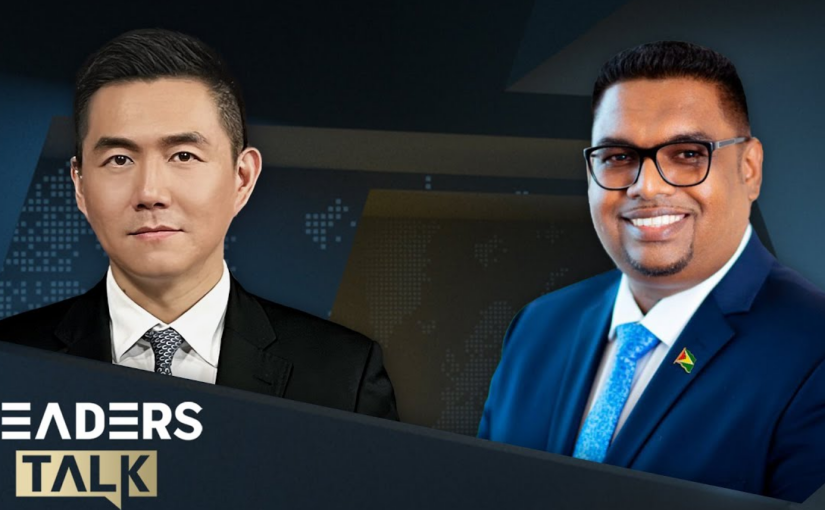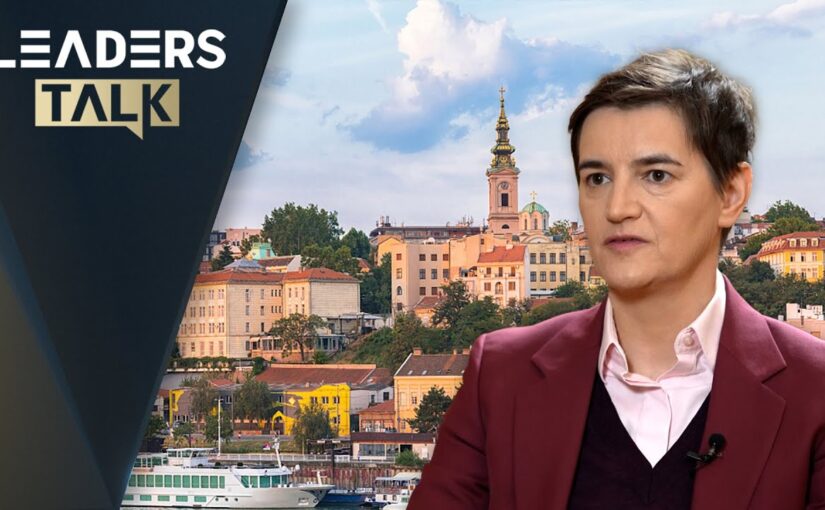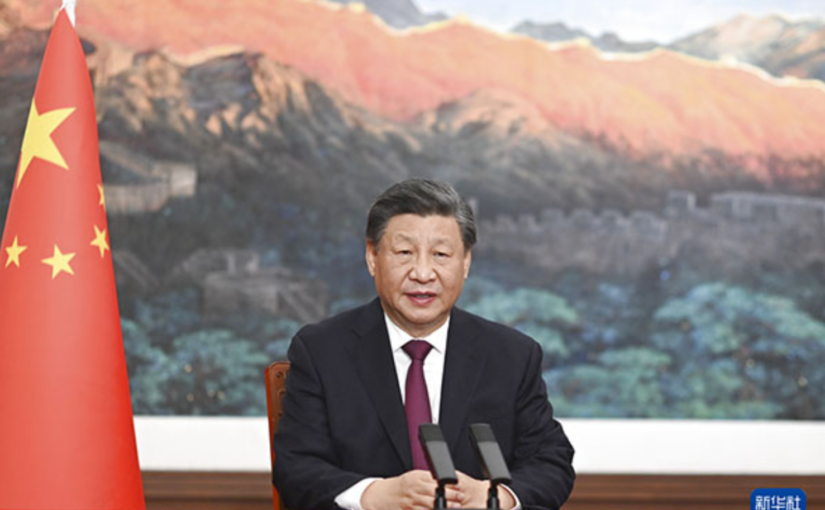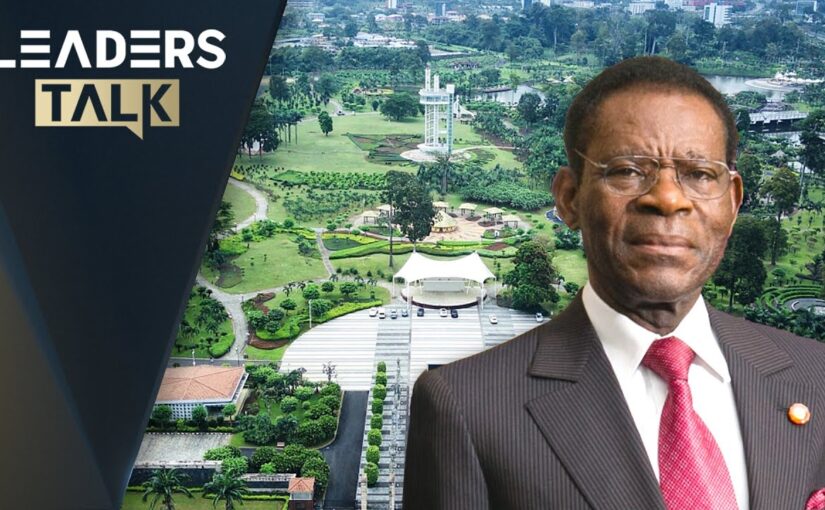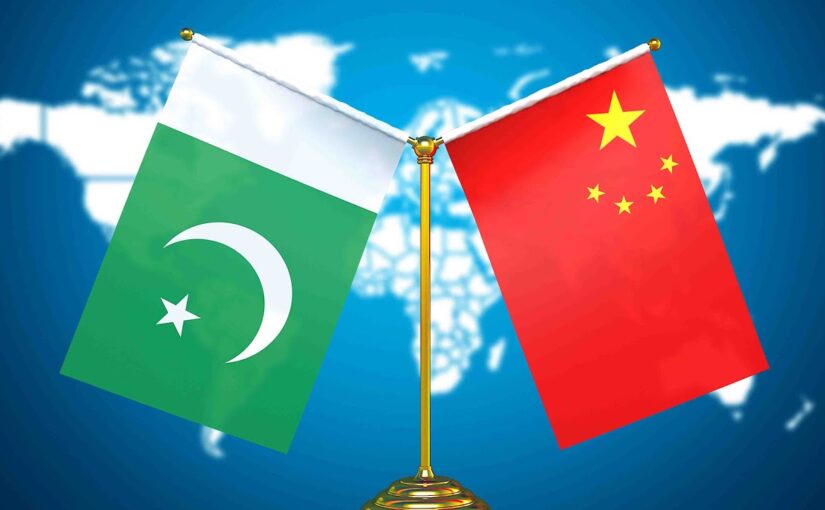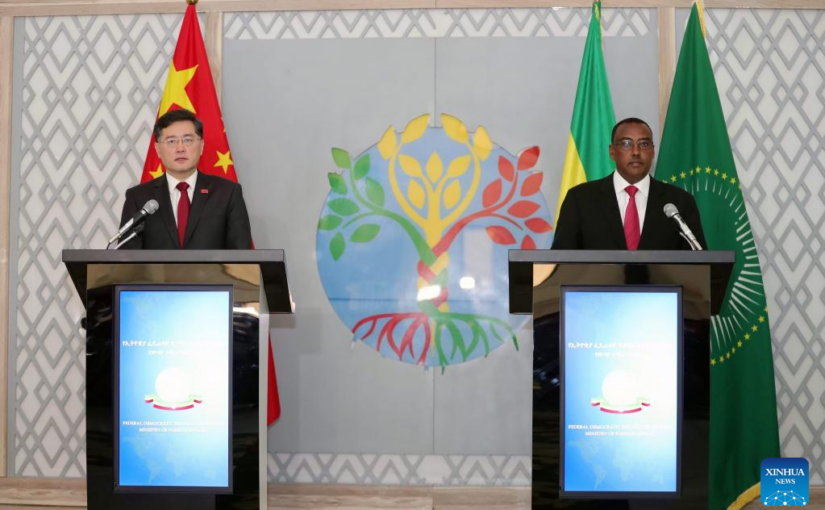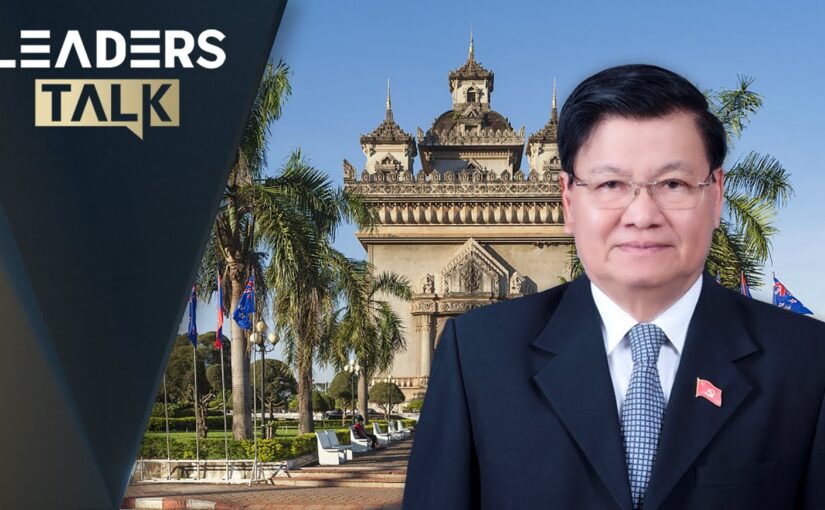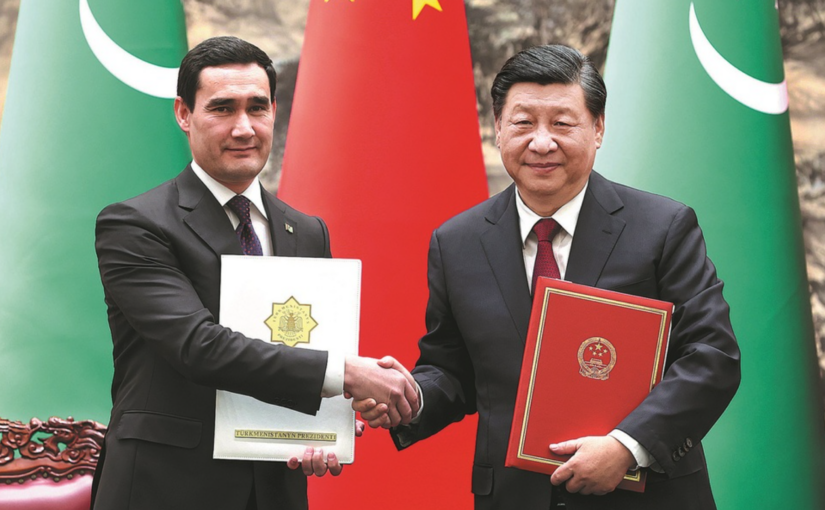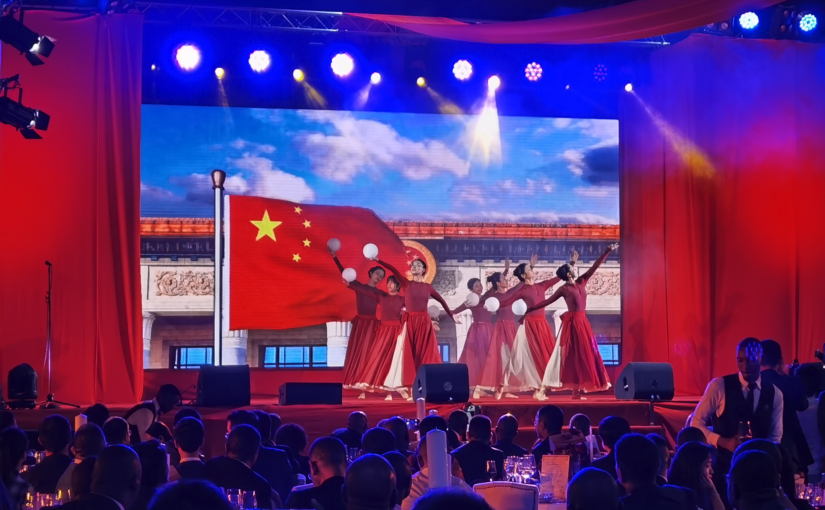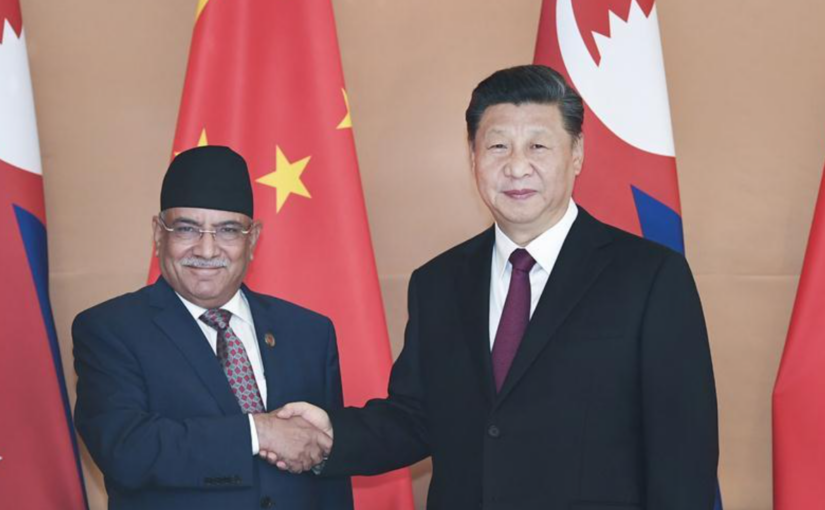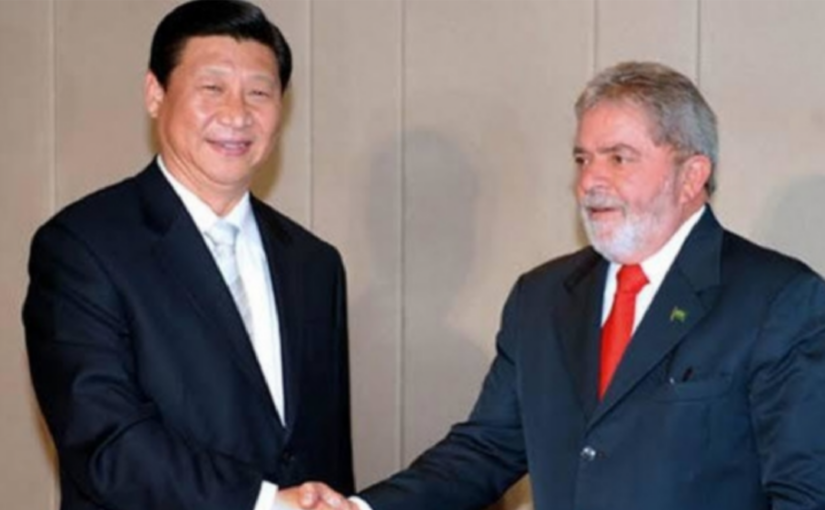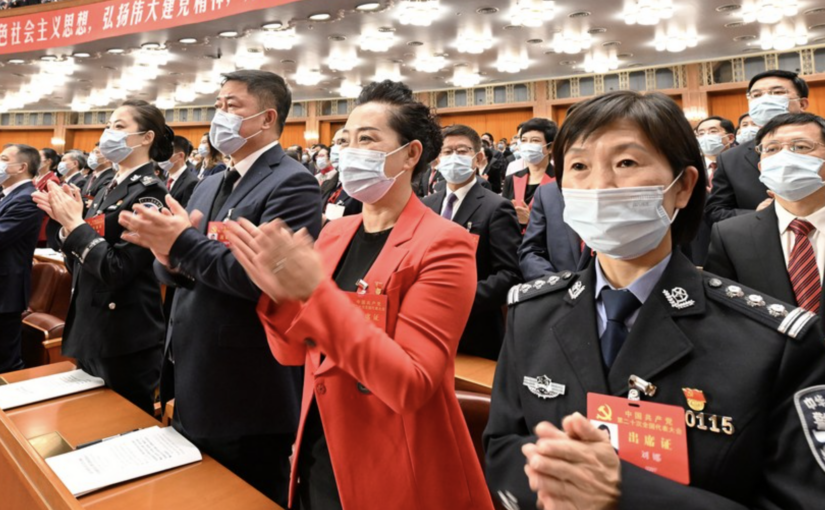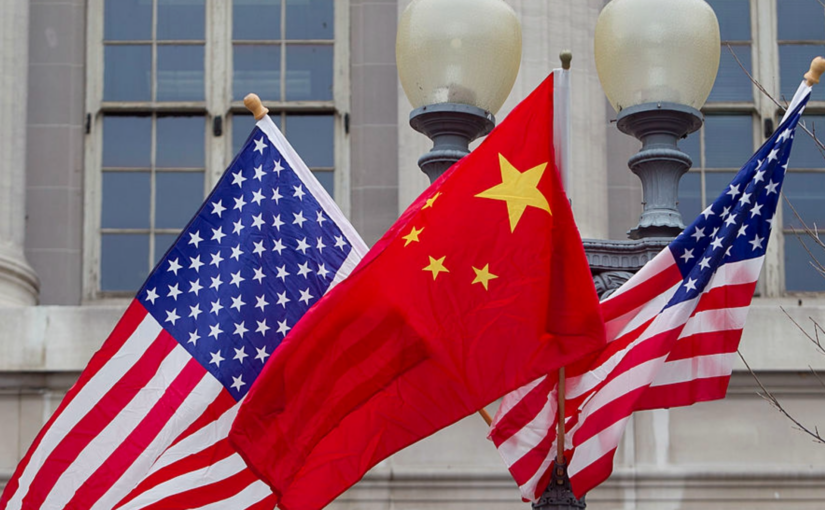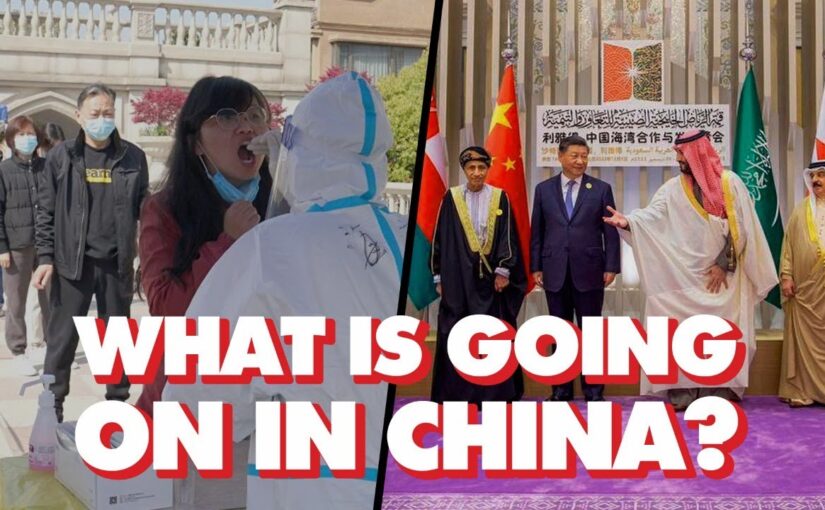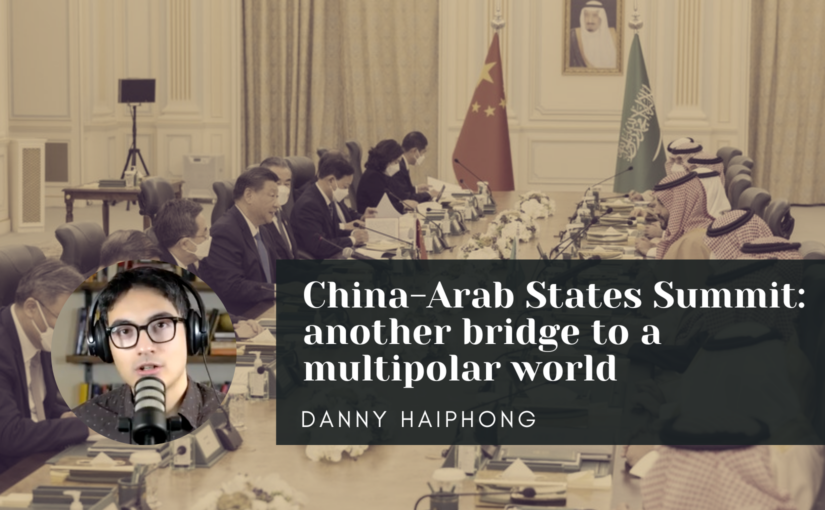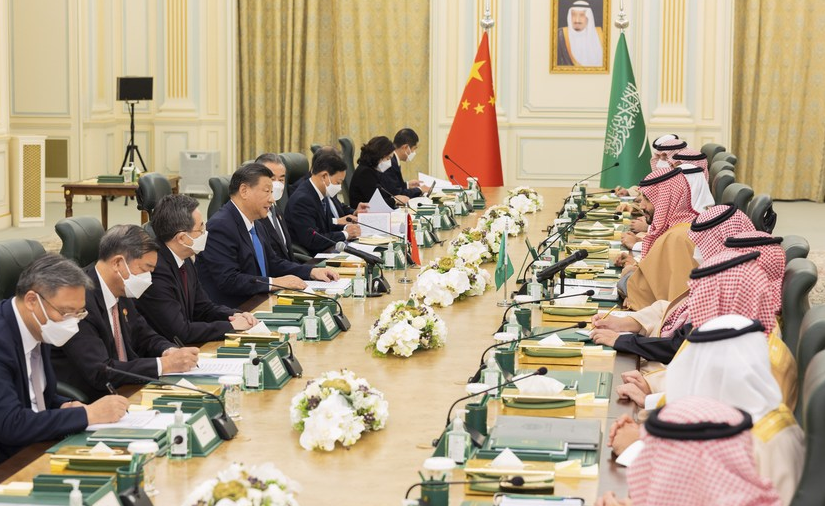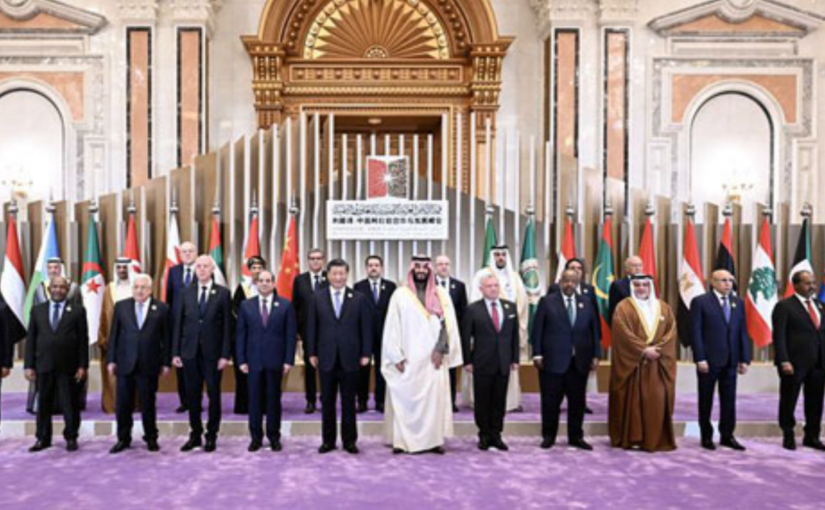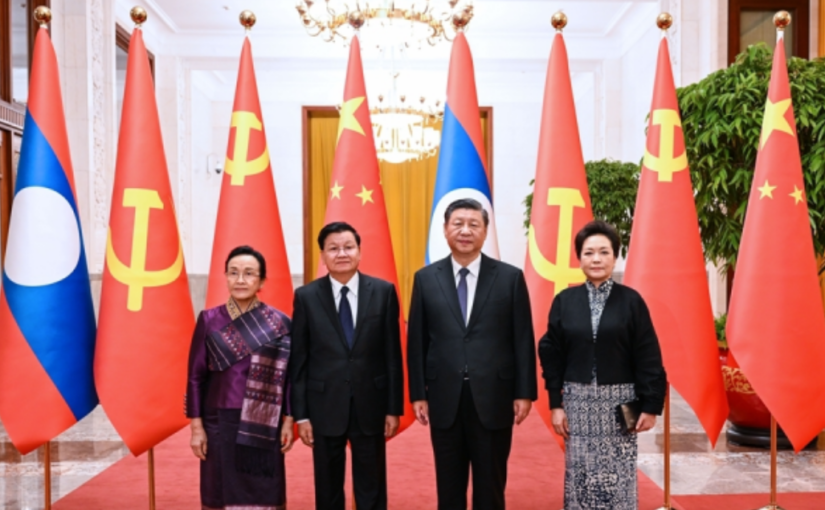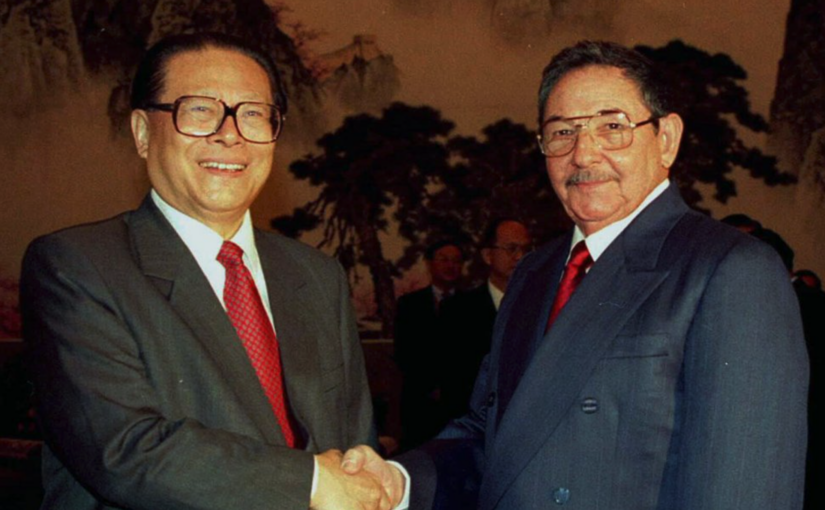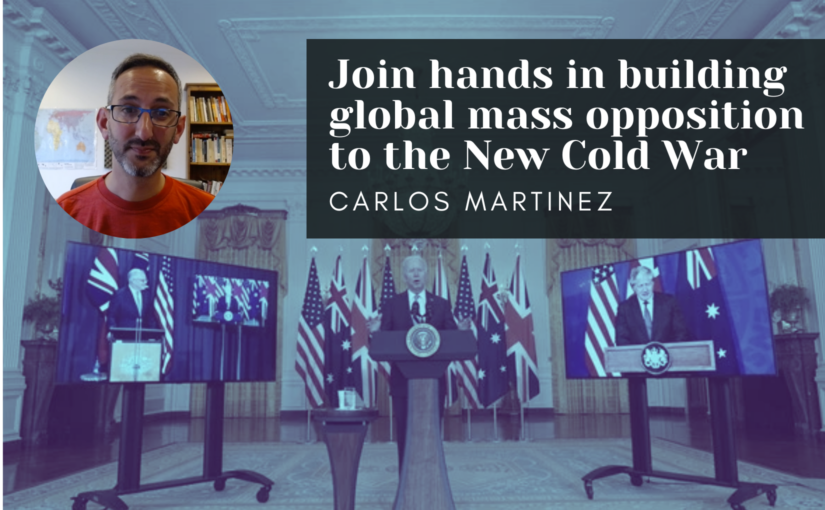In this edition of the CGTN series Leaders Talk, Wang Guan interviews Dr. Mohamed Irfaan Ali, President of Guyana. The only English-speaking country in the South American mainland, for reasons of historical and cultural background, Guyana is also considered a part of the Caribbean. In 1972, Guyana became the first country in the English-speaking Caribbean to establish diplomatic relations with China. And in 2018, it became the first country in South America to join China’s Belt and Road Initiative (BRI).
But whilst China and Guyana have enjoyed just over 50 years of diplomatic relations, the Chinese presence in Guyana dates back to 1853, which leads President Ali to describe Sino-Guyanese relations as imperishable ones, based on shared ties of blood and history. The Chinese, he says, are part of our country and its diversity and bloodline. This finds expression in a line of the Guyanese national anthem: One land of six peoples, united and free.
Indeed, the first President of Guyana, Arthur Chung, was himself of Chinese heritage, serving between 1970-1980 and visiting China in 1977, five years after the establishment of diplomatic relations. Opening the Arthur Chung Convention Centre in 2015, then President David A. Granger said: “I would like the first President in this country to be remembered… This is the 45th anniversary year of becoming a Republic and Mr. Chung was the first person of Chinese descent who was President in a non-Asian country and it was historic.”
With the recent discovery of massive oil reserves, Guyana has been registering exponential rates of economic growth. President Ali reveals that by 2027-28, Guyana is expecting to produce close to one million barrels of oil per day (bpd). He wants to use this to give the people the best possible education and health care, develop and diversify agriculture, enhance manufacturing and industry, bring down energy costs, meet the housing needs of every single family, and establish proper institutional mechanisms to protect revenues, thereby ensuring that the country enjoys a ‘resource blessing’ rather than a ‘resource curse’.
China is already involved in his country’s oil consortium, but besides welcoming further bids and tenders from Chinese companies, going forward Dr. Ali is particularly keen to see China become Guyana’s most important partner on a path of low carbon development, with gas playing a transitional role, but also focusing on hydro, solar and wind, to fast track green energy development.
President Ali stresses that his country respects the One China Principle and the One China Policy, seeing them as a key plank of international peace and security, just like the regional demand for the Caribbean to be a Zone of Peace. Referencing conflicts such as the ongoing one in Ukraine, he notes that it is the developing world and the poorest countries, who, as a result, face the worst crises in, for example, food and fuel price inflation.
China’s ‘thought leadership’, as expressed, for example, in the Global Security Initiative and the Global Development Initiative, as well as the BRI, can, in the president’s view, contribute especially to the resolution of four key global crises – of inequality, climate change, food security, and energy security. The developing countries, he notes, did not cause these crises, but suffer the most from them.
Stressing that both countries are committed to growing their relations, President Ali says that this work should put people at the centre. If there is investment in the future generations, knowledge and technology transfers, and cultural exchanges, the bilateral ties can only get stronger.
The full interview is embedded below.
Category: International relations
CGTN interview with Serbian PM Ana Brnabić
In this episode of the CGTN series Leaders Talk, Zou Yun travels to Belgrade to interview Ana Brnabić, Serbia’s first woman Prime Minister, who has held office since June 2017.
According to Brnabić, the friendship between Serbia and China can be described as steel-like or ironclad in both the political and economic fields. She recalls the 1999 bombing of Serbia – and Montenegro – by US-led NATO, without any United Nations authorisation, which killed and injured thousands and displaced millions, noting that it is therefore very difficult for western countries to accuse anyone else of aggression. Brnabić was living in the UK at the time and found it very difficult not to be in her country but away from family and friends. The bombing of the Chinese Embassy, in which three Chinese journalists were killed, will, she said, never be forgotten by the people of either country and had created a very special emotional bond between them. During his state visit to Serbia in 2016, President Xi Jinping inaugurated an impressive Chinese Cultural Centre on the site of the former embassy.
Explaining Serbia’s attempts to pursue a balanced foreign policy, including with China, Russia and the European Union, Brnabić notes that China has proven to be a true friend, especially in the most difficult moments of crisis. Trade with China has boomed and she is looking forward to the conclusion of a Free Trade Agreement between the two countries. Recalling her visit to China’s Shanghai Import Expo in 2019, she strongly refutes the allegations that China practices protectionism. Serbia’s experience proves the opposite.
Congratulating China on the success of the Communist Party’s 20th National Congress, Prime Minister Brnabić describes General Secretary Xi Jinping’s election to a third term of office as good news for the entire world. Serbia, she says, is keen to replicate some of China’s development initiatives.
The full interview is embedded below.
Xi Jinping address to the CELAC Summit
The Community of Latin American and Caribbean States (CELAC) held its seventh summit meeting in the Argentine capital Buenos Aires on January 24th. CELAC groups 33 countries – that is, every country in the Americas with the exceptions of the USA and Canada. As such, it is one of the most important and representative bodies of Global South unity and solidarity.
All 33 member states were represented at the summit, 23 of them at head of state or government level. With the recent resurgence of the left in Latin America, the organisation has acquired a new lease of life, and nothing represented that more clearly than the presence of President Lula of Brazil. It was a case of ‘Lula returns; Lula returns Brazil’, as his far-right predecessor Jair Bolsonaro had suspended Brazil’s participation in the organisation. The CELAC family is once again complete.
Addressing the summit, Lula noted that its first gathering had taken place back in 2008 in the Brazilian state of Bahia. It was, he noted, the first time that Latin American heads of state had met without foreign tutelage, “to discuss our problems and seek our own solutions to the challenges we share.” Stressing the importance of multilateralism and multipolarity, Lula reminded his fellow leaders that, “nothing must separate us, since everything unites us.”
Another key indicator of the regional advance of progressive forces was the presence of Gustavo Petro, who assumed office as the first left-wing President of Colombia in August 2022. In his speech, Petro pointed out that Latin American countries can overcome their development limitations if they come together to increase the region’s geopolitical weight in the current world order. To achieve this, he proposed to collectively address what he considered the main problem facing humanity today, namely the exponential imbalances that contemporary capitalism generates in ecosystems.
For his part, Bolivian President Luis Arce called for strengthening the multilateral system in order to save the earth. “Today we are facing a multiple and systemic capitalist crisis that increasingly puts the lives of humanity and our Mother Earth at risk, a food, water, energy, climate, health, economic, commercial, and social crisis,” he said. “CELAC must return to the principles of multilateralism, but not to preserve the unfair international order that overwhelms states and peoples, but rather to move towards a better world.”
Hosting the summit, Argentine President Alberto Fernández was one of many to speak out strongly against the USA’s unilateral sanctions and blockades against Cuba, Venezuela and Nicaragua. This was also reflected in a 111-point Buenos Aires Declaration, adopted by the 33 nations, which also called for consolidating the region as a zone of peace free of nuclear weapons, advancing food security and deepening cooperation in health care. The declaration also expressed solidarity with Argentina’s demand for the return of the Malvinas (Falkland) and neighbouring islands and territorial seas from British colonial rule as well as for Puerto Rico’s right to self-determination.
At the conclusion of the summit, Ralph Gonsalves, Prime Minister of Saint Vincent and the Grenadines, took over from President Fernández as the pro tempore president of CELAC for the coming year. It is the first time for a member of the Caribbean Community (Caricom) to occupy this post.
One very important aspect of the summit, which highlighted the indispensable role of socialist China in cohering and standing in solidarity with the forces of the Global South, was the address to the summit, upon invitation and via video link, of President Xi Jinping.
Xi Jinping noted that Latin American and Caribbean (LAC) countries are important members of the developing world. CELAC, he noted, has grown to be an indispensable driving force behind global South-South cooperation. It has played an important role in safeguarding regional peace, promoting common development and advancing regional integration.
President Xi Jinping stressed that China always supports the regional integration process of Latin America and the Caribbean. “We highly value our relations with CELAC and take the organisation as our key partner in enhancing solidarity among developing countries and furthering South-South cooperation.” He added that more and more countries in the region have engaged in high-quality Belt and Road cooperation with China, supported and participated in the Global Development Initiative and the Global Security Initiative, and are working with China in building a China-LAC community with a shared future.
The following article was originally published on the website of the Chinese Foreign Ministry.
On January 24, the seventh Summit of the Community of Latin American and Caribbean States (CELAC) is held in Buenos Aires, the capital of Argentina. Upon the invitation of President Alberto Fernández of Argentina, the rotating president of CELAC, President Xi Jinping delivered a video address at the summit.
President Xi Jinping noted that Latin American and Caribbean (LAC) countries are important members of the developing world. They also take an active part in global governance and make important contributions to it. CELAC has grown to be an indispensable driving force behind global South-South cooperation. CELAC has played an important role in safeguarding regional peace, promoting common development and advancing regional integration.
President Xi Jinping stressed that China always supports the regional integration process of Latin America and the Caribbean. We highly value our relations with CELAC, and take CELAC as our key partner in enhancing solidarity among developing countries and furthering South-South cooperation. That is why China has been working with LAC countries to steadily strengthen the China-CELAC Forum and take the China-LAC relationship into a new era characterized by equality, mutual benefit, innovation, openness and benefits for the people. More and more countries in the region have engaged in high-quality Belt and Road cooperation with China, supported and participated in the Global Development Initiative and the Global Security Initiative, and are working with China in building a China-LAC community with a shared future.
President Xi Jinping stressed that the world is in a new period of turbulence and transformation. We can only tackle the challenges and tide over this trying time through greater solidarity and closer cooperation. China is ready to continue working with LAC countries to help each other and make progress together, and advocate “peace, development, equity, justice, democracy and freedom” — the common values of mankind. China is ready to join hands with LAC countries to promote world peace and development, build a community with a shared future for mankind, and open up an even brighter future for the world.
President Obiang: China is the first partner to help Equatorial Guinea
In this episode of the new CGTN series Leaders Talk, Li Peichun interviews Africa’s longest-serving head of state, President Teodoro Obiang Nguema Mbasago of Equatorial Guinea.
A Spanish colony for centuries, Equatorial Guinea was one of the poorest countries in Africa when it finally achieved independence in 1968. It was only with the discovery of major oil reserves that the country embarked on the road of rapid development in the 1990s. However, with reductions in the price of oil in recent years, the country now faces the task of economic diversification. President Obiang explains that as soon as his country discovered oil, it set out a short, medium and long-term national development plan, with the intention that the gains from oil production be used for national investment. The country’s economic diversification programme lays emphasis on agriculture and fisheries, so that the country can become self-sufficient in food and not rely on any one product.
President Obiang paid the first of his 10 state visits to China in 1984, two years after he assumed the presidency. In the interview, he reflects on the major changes he has observed in China over that period, from a country where the main form of transportation was the bicycle to a strong economic power, with modern infrastructure, and a major provider of aid to developing countries. In his view, the ideal of the Communist Party of China (CPC) is to serve the people of China wholeheartedly, by promoting development and modernisation, so as to make both the country and the people strong. The CPC, the President says, is a pioneer party that can help other political parties, especially his Democratic Party of Equatorial Guinea (PDEG), to develop their own ideals and principles.
The programme highlights how, when Covid-19 was first detected in Wuhan, Equatorial Guinea promptly donated US$2million to assist the Chinese city in dealing with the unexpected outbreak. Later, China sent medical experts and materials, as well as batches of vaccines, to help Equatorial Guinea to fight the virus. Due to their trust in China, President Obiang and his family opted to receive Chinese vaccinations.
Turning to China’s Belt and Road Initiative (BRI), President Obiang begins by noting that the development of Africa should be led by Africans. African leaders, he insists, must think about how to improve their countries, else they will not prosper. It was on this basis that his country had decided to cooperate with the BRI, because China is the first partner to help Equatorial Guinea and even Africa as a whole. The BRI, he notes, is the way for Africa to overcome the underdevelopment, suffering and poverty it is currently facing.
Refuting accusations of Chinese ‘neo-colonialism’ or ‘debt trap diplomacy’, President Obiang is crystal clear: “This is a smear and western countries should be ashamed of it.” Africa, he notes, receives very little assistance from the western countries, and what they do receive is accompanied by political conditions that undermine the stability of the country. “Those who want to accept such assistance are often those who encounter great difficulties.” China, he notes, did not colonise any African countries, it was the west, so their criticism is intended to contain China and to prevent it from helping the development of the African continent. “But we have discovered that China is our best friend… Equatorial Guinea has not received any international development assistance except from China.”
In another example of the close friendship between the two countries, towards the end of the interview, President Obiang sends a personal message to the students of the China-Equatorial Guinea Friendship Primary School in China’s south-western Yunnan province, whose renovation was paid for by the Equatorial Guinean government.
The full interview is embedded below.
China-Pakistan friendship “higher than mountains and deeper than oceans”
The special and invariable relationship between China and Pakistan was underlined and reinforced in phone calls between leaders of the two countries in early January.
On January 5, Premier Li Keqiang spoke with his Pakistani counterpart, Prime Minister Shahbaz Sharif. Li Keqiang said that the China-Pakistan friendship has stood the test of international vicissitudes and grown from strength to strength. China always sees China-Pakistan relations as a priority in its neighborhood diplomacy, and will continue to support Pakistan in safeguarding national independence, sovereignty, territorial integrity and legitimate rights and interests, upholding domestic solidarity and stability and realizing national development and rejuvenation.
On his part, Shahbaz thanked China for providing tremendous support and assistance for Pakistan in the fight against floods, and highly appreciated China for always standing together with Pakistan when it encounters difficulties. He noted that this has fully demonstrated the “ironclad” friendship between Pakistan and China that is higher than mountains and deeper than oceans.
This was followed on January 9 by a phone call between newly appointed Chinese Foreign Minister Qin Gang and his Pakistani counterpart Bilawal Bhutto Zardari.
Qin Gang said that China and Pakistan enjoy special friendship and high-level mutual trust. Bilawal once again congratulated Qin Gang on his assuming office as China’s Foreign Minister, saying that the ironclad brotherhood between China and Pakistan is the “North Star” guiding Pakistan’s foreign policy toward China.
The following reports were originally published on the website of the Chinese Foreign Ministry.
Li Keqiang Speaks with Pakistani Prime Minister Shahbaz Sharif on the Phone
Ministry of Foreign Affairs, 5 January 2023
On the afternoon of January 5, 2023, Premier Li Keqiang of the State Council had a phone call at request with Pakistani Prime Minister Shahbaz Sharif at Ziguangge of Zhongnanhai.
The Premier and the Prime Minister first exchanged New Year greetings. Li Keqiang said that the China-Pakistan friendship has stood the test of international vicissitudes and grown from strength to strength. China always sees China-Pakistan relations as a priority in its neighborhood diplomacy, and will continue to support Pakistan in safeguarding national independence, sovereignty, territorial integrity and legitimate rights and interests, upholding domestic solidarity and stability and realizing national development and rejuvenation. Mr. Prime Minister’s successful visit to China not long ago has given a strong boost to the development of bilateral relations. China is ready to have close high-level exchanges with Pakistan, advance practical cooperation in key fields, and work towards the greater development of China-Pakistan relations.
Continue reading China-Pakistan friendship “higher than mountains and deeper than oceans”China supports peace, unity and development in Ethiopia
During his recent visit to Ethiopia, the first leg of his ongoing Africa tour, Chinese Foreign Minister Qin Gang addressed the current peace process in the East African country in a press conference he gave together with Ethiopian Deputy Prime Minister and Foreign Minister Demeke Mekonnen.
Asked for his views on the recent peace agreement, signed on November 2, 2022 in South Africa, Qin Gang noted that that Ethiopia is the common home of all Ethiopian people, including those from Tigray.
Ethiopia has now entered a new stage of looking forward to peace and focusing on development after the recent signing of a ceasefire agreement between the federal government of Ethiopia and the Tigray People’s Liberation Front (TPLF), which has been gradually implemented, he said.
China is sincerely glad to see this and extends warm congratulations to the government and people of Ethiopia, Qin added.
He said China has always taken the view that the conflict in Tigray is an internal affair of Ethiopia and that the Ethiopian people have the wisdom and ability to independently resolve their internal differences.
The TPLF was the principal component of the now defunct Ethiopian People’s Revolutionary Democratic Front (EPRDF), which was the ruling party in Ethiopia until 2019.
Qin Gang also responded to questions on the “Outlook on Peace and Development in the Horn of Africa”, proposed by China.
The following article was originally published by the Xinhua News Agency.
Chinese Foreign Minister Qin Gang on Tuesday addressed members of the press along with Ethiopian Deputy Prime Minister and Foreign Minister Demeke Mekonnen, after their talks in Addis Ababa.
When asked about China’s views on the peace agreement in Ethiopia and the progress of the China-proposed “Outlook on Peace and Development in the Horn of Africa” in Ethiopia, Qin said that Ethiopia is the common home of all Ethiopian people, including those from Tigray.
Ethiopia has now entered a new stage of looking forward to peace and focusing on development after the recent signing of a ceasefire agreement between the federal government of Ethiopia and the Tigray People’s Liberation Front (TPLF), which has been gradually implemented, he said.
Continue reading China supports peace, unity and development in EthiopiaVideo: Lao president speaks about close bonds with China
In this episode of the new CGTN series Leaders Talk, Zou Yun interviews Thongloun Sisoulith, President of Laos and Secretary-General of the Lao People’s Revolutionary Party.
Describing the inauguration of the Laos-China High-Speed Railway as the dream of the Lao people come true, President Thongloun refers to the long history of brotherly connections between the two countries and peoples, specifically to their helping each other in the fight against foreign aggressors. During the Lao people’s war of liberation, the communist party, army and people of China rendered timely, effective and unconditional support to their Lao comrades, and this friendship, comradeship and brotherhood has continued in the new phase of nation building.
Thongloun recalls his own first visit to China in 1970, when he was a young man in his 20s, working in the Hanoi office of the Lao Patriotic Front. At that time he was escorting 500 students who were to study at the China-Laos Friendship School, which had been established in the city of Nanning in 1967. With Laos facing a brutal US war of aggression, “we sent our kids to China for the Chinese comrades to take care of them.”
Over many subsequent visits to China, Thongloun notes that the Chinese economy has boomed, the country has remained stable, and China has become a pillar of world peace and stability.
He speaks at some length about his impressions of, and personal relationship with, President Xi Jinping, which is clearly characterised by a deep friendship and comradeship. He also talks about the cultural similarities between Laos and China. Noting that China has “many good old revolutionary songs”, he says that he “loves them very much.”
Zou Yun also takes a ride on the high-speed train to get the impressions of some passengers.
The full interview is embedded below.
China hosts state visits from the Philippines and Turkmenistan
China’s diplomatic year began in the first week of January with President Xi Jinping hosting state visits by President Ferdinand Romualdez Marcos Jr. of the Philippines from January 3-5 followed by that of President Serdar Berdimuhamedov of Turkmenistan from January 5-6. China’s hosting in this way of two leaders from neighbouring countries, in South East Asia and Central Asia respectively, reflects the strong and increasing emphasis given in its foreign policy to relations with fellow Asian countries, neighboring countries in particular.
Marcos was not only the first foreign leader hosted by China in 2023 – this was also his first visit to China since he assumed his country’s presidency on June 30 2022 and his first official visit to a country outside the Association of South East Asian Nations (ASEAN). However, he is certainly no stranger to the country. In 1974, at the age of 17, he accompanied his mother, Imelda Marcos to a meeting in Beijing with the late Chairman Mao Zedong, one year before his father, the late President Ferdinand E. Marcos established diplomatic relations with the People’s Republic.
His visit this time was a major success, resulting in the adoption of an extensive Joint Statement between the two countries along with 14 cooperation documents across a wide range of sectors. In particular, both sides agreed to continue to properly handle maritime issues through friendly consultation and resume negotiations on oil and gas exploration.
According to their joint statement: “The two leaders had an in-depth and candid exchange of views on the situation in the South China Sea, emphasized that maritime issues do not comprise the sum-total of relations between the two countries and agreed to appropriately manage differences through peaceful means. Both sides reaffirmed the importance of maintaining and promoting peace and stability in the region and the freedom of navigation in and overflight above the South China Sea, and reached consensus on the peaceful resolution of disputes on the basis of the Declaration on the Conduct of Parties in the South China Sea (DOC), the United Nations Charter and the 1982 United Nations Convention on the Law of the Sea (UNCLOS).”
For his part, President Xi, “expressed readiness to stay in regular strategic communication with President Marcos Jr. and make comprehensive plans for the growth of bilateral ties so that the two countries will stay good neighbors helping each other, good relatives sharing affinity, and good partners pursuing win-win cooperation, delivering more benefits to the two peoples and contributing more positive energy to peace and stability in the region.”
All of this constitutes a significant blow to the efforts of the United States, which has worked overtime to create and exacerbate discord between the Philippines and China over the maritime and other issues with a view to maintaining its own neo-colonial domination over the Philippines alongside its strategic position in the region.
Hosting his Turkmen counterpart, Xi Jinping highlighted the similar values, goals and converging interests shared by the two nations, saying that they should work together in their respective paths toward rejuvenation, enhance their strengths, explore further potential for cooperation and attain common growth. It was the two leaders’ second meeting in a few months, having met in September on the sidelines of the Shanghai Cooperation Organization (SCO) Summit held in the Uzbek city of Samarkand.
At their meeting this time, they announced that their two countries were elevating their bilateral ties to those of a comprehensive strategic partnership. Turkmenistan is a major producer of natural gas and President Xi noted that cooperation in this sector is the cornerstone of their bilateral relations, with the two countries needing to further explore the potential for cooperation in green energy, natural gas exploitation and technological equipment, and work toward cooperation covering whole industry chains.
Turkmenistan is a key supplier of natural gas to China, with the two nations having developed three gas pipelines in a project known as the China-Central Asia Gas Pipeline. The project supplies natural gas to over 500 million residents in 27 provincial-level regions and the Hong Kong Special Administrative Region, according to Xinhua News Agency.
Berdimuhamedov told a ceremony in June that the construction of a fourth line of the China-Central Asia Gas Pipeline will take the annual transmission capacity to China to 65 billion cubic meters. The current pipeline delivered over 40 billion cubic meters of natural gas in the January-November period last year, according to its operator.
During their meeting, Xi said the cooperation mechanism between China and the five Central Asian countries is open, transparent, mutually beneficial, equal and pragmatic. China stands ready to work with Turkmenistan to ensure the success of the first summit between China and the five nations, he said.
Xi said China supports constructive cooperation between Turkmenistan and the Shanghai Cooperation Organization, and is willing to make joint efforts in practicing true multilateralism. Since its emergence as an independent state, following the dissolution of the Soviet Union, Turkmenistan has firmly upheld its independence and practices strict neutrality. It presently attends SCO meetings in the capacity of an official guest. Coinciding with his visit, President Berdimuhamedov contributed an article to the Decision Makers platform of CGTN, where he wrote that:
“Turkmenistan closely monitors the development of China and is pleased with the nation’s achievements. In a very short period of its history, China has emerged as a world pioneer in economic and scientific development, with robust growth in industrial output and the completion of many large-scale social development programs. China has managed to pull off an outstanding achievement ‒ the eradication of absolute poverty. Today, China is taking confident steps towards building a modern socialist country in an all-round way. There is no doubt that the above brilliant achievements are made possible by the political will, strong determination and correct strategic policies of the Communist Party of China, as well as the understanding and support of the Chinese people.”
The following articles were originally published by the Xinhua News Agency, China Daily and CGTN.
China, Philippines cement ties in new year
Xinhua, 5 January 2023
Chinese President Xi Jinping held talks with Philippine President Ferdinand Romualdez Marcos Jr. at the Great Hall of the People during the latter’s state visit to China on Wednesday.
Marcos is the first foreign leader hosted by China in 2023. This visit is his first visit to China as president and his first official visit to a country outside the Association of Southeast Asian Nations (ASEAN).
“This speaks volumes about the close ties between China and the Philippines and the important place that the two countries take in each other’s foreign policies,” Xi told Marcos.
A journey to retrace history and plan for the future
China and the Philippines are close neighbors facing each other across the sea. In their exchanges over a millennium, good faith and mutual assistance have remained the defining feature of bilateral relations and a precious legacy cherished by the two peoples, Xi said.
Continue reading China hosts state visits from the Philippines and TurkmenistanChina and Angola celebrate 40 years of diplomatic relations
China and Angola celebrated the 40th anniversary of their establishing diplomatic relations on January 12, with an exchange of messages between President Xi Jinping and his Angolan counterpart João Lourenço.
Xi pointed out in his message that since the establishment of diplomatic ties, China and Angola have always been sincere and friendly towards each other, worked hand in hand, and understood and supported each other on issues involving their respective core interests and major concerns.
For his part, Lourenço noted that the two countries agree with each other on many international issues. He said Angola is willing to strengthen friendly and cooperative relations with China, build a shared win-win future, as well as achieve common progress, prosperity and development, so as to bring more benefits to the people of the two countries.
Meanwhile, some 600 people attended a reception marking the occasion on the evening of July 11, held by the Chinese Embassy in the Angolan capital Luanda. Chinese Ambassador to Angola Gong Tao said in his address that China and Angola have always adhered to solidarity and mutual assistance, achieving fruitful cooperation and exchanges in various areas during the past 40 years.
For many years, China has been Angola’s biggest trading partner, biggest export market, and significant source of investment. In turn, Angola has become China’s second-largest trading partner and the largest supplier of crude oil in Africa.
Underlining these excellent relations, Chinese Foreign Minister Qin Gang, presently on a tour of Africa, will visit Angola shortly.
The following articles were first published by the Xinhua News Agency.
Xi, Angolan president exchange congratulations on 40th anniversary of diplomatic ties
Xinhua, 12 January 2023
Chinese President Xi Jinping on Thursday exchanged congratulations with Angolan President Joao Lourenco on the 40th anniversary of diplomatic relations between the two countries.
Xi pointed out in his message that since the establishment of diplomatic ties 40 years ago, China and Angola have always been sincere and friendly towards each other, worked hand in hand, and understood and supported each other on issues involving their respective core interests and major concerns.
At present, China-Angola relations enjoy a sound development momentum, and bilateral cooperation in various fields has yielded fruitful results, bringing tangible benefits to the people of the two countries, Xi noted.
Continue reading China and Angola celebrate 40 years of diplomatic relationsChina extends congratulations to leaders of South Africa, Antigua and Barbuda, and Nepal
China’s leaders exchanged some significant messages with foreign counterparts around the turn of the new year.
On December 31st 2022, President Xi Jinping wrote to his South African counterpart Cyril Ramaphosa, who he met most recently in November at the G20 Summit in Bali, Indonesia, to congratulate him on his re-election as President of the ruling African National Congress at the ANC’s National Conference. Xi noted that the Communist Party of China and the ANC enjoy a profound traditional friendship and fruitful exchanges and cooperation, which has played an important role in promoting the in-depth development of the comprehensive strategic partnership between the two countries.
On January 1st, Xi exchanged messages with Rodney Williams, Governor-General of Antigua and Barbuda, on the 40th anniversary of their establishing diplomatic relations. Describing Antigua and Barbuda as China’s important cooperative partner in the Caribbean, Xi noted that over four decades, bilateral relations have been developing smoothly with ever stronger political mutual trust, fruitful practical cooperation and ever deeper friendship between the two peoples.
Chinese Premier Li Keqiang also exchanged greetings with Antigua and Barbuda Prime Minister Gaston Browne, who noted that Antigua and Barbuda has always pursued the one-China policy and that China has provided generous assistance for Antigua and Barbuda.
Having been colonised in the 17th century, Antigua and Barbuda finally won independence from British colonial rule on November 1st 1981 and established diplomatic relations with China on January 1st 1983. Today the country plays an active part in the Caribbean Community (Caricom) as well as in ALBA, the progressive regional alliance led by Cuba and Venezuela.
Following a general election, on December 26th 2022, Pushpa Kamal Dahal, also known as Prachanda, the leader of the Communist Party of Nepal (Maoist Center) returned as Prime Minister of Nepal, a position he last held in 2017, at the head of a coalition government that also includes Nepal’s other major communist party, the Communist Party of Nepal (Unified Marxist Leninist). On December 29th, Premier Li Keqiang sent a message to his Nepalese counterpart, noting that China and Nepal were traditional friendly neighbors linked by mountains and rivers, have always respected each other, treated each other as equals and sincerely helped each other.
The following reports were originally carried by the Xinhua News Agency.
Xi congratulates Cyril Ramaphosa on re-election as president of African National Congress
Xinhua, 31 December 2022
Chinese President Xi Jinping on Saturday congratulated Cyril Ramaphosa on his re-election as president of the African National Congress (ANC), South Africa’s ruling party.
In his message, Xi said he is glad to hear of Ramaphosa’s re-election, and would like to extend sincere congratulations to him. Xi also wishes Ramaphosa new and greater success.
Continue reading China extends congratulations to leaders of South Africa, Antigua and Barbuda, and NepalXi Jinping congratulates Lula on inauguration as Brazilian president
On January 1st, the progressive forces in Latin America, standing for independence against imperialism, national development and social progress, took a big step forward with the return as President of Brazil of Luiz Inácio Lula da Silva.
A co-founder of the BRICS, which presently groups Brazil, Russia, India, China and South Africa, and veteran leader of Brazil’s Workers’ Party (PT), Lula addressed his country’s Congress as “a representative of the working class”, who “promotes economic growth in a sustainable way and to the benefit of all, especially those most in need.” The full text of Lula’s emotional and inspiring inauguration speech and his address to Congress can be read here.
In his message of greetings to his Brazilian counterpart, Chinese President Xi Jinping said that he attaches great importance to the development of the China-Brazil comprehensive strategic partnership, and is willing to work with Lula to continue to firmly support each other in taking a development path in line with their own national conditions, respect each other’s core interests, promote their practical cooperation, strengthen multilateral coordination, and lead and push the partnership to a higher level from a strategic and long-term perspective, so as to better benefit the two countries and their people.
China’s Vice President Wang Qishan attended the inauguration in the capital Brasilia as the Special Representative of President Xi. Wang joined a large number of other world leaders, including what amounted to a roll call of progressive Latin America, namely:
- President Gustavo Petro of Colombia
- President Xiomara Castro of Honduras
- President Luis Arce of Bolivia and former President Evo Morales
- President Alberto Fernandez of Argentina
- President Gabriel Boric of Chile
- President Irfaan Ali of Guyana
- Former President Pepe Mujica of Uruguay (as part of a bipartisan national delegation that also included the current and another former President)
- Prime Minister Ralph Gonsalves of Saint Vincent and the Grenadines
- Cuban Vice-President Salvador Valdés Mesa
- Nicaraguan Foreign Minister Denis Moncada
- Mexican First Lady Beatriz Gutiérrez Müller
- President of the Venezuelan National Assembly Jorge Rodriguez (according to the Orinoco Tribune, President Nicolás Maduro had been due to attend but was prevented by a last-minute security issue.)
They were also joined by a range of political leaders from other countries, including Russia, Serbia, Azerbaijan, Palestine, Iran, Algeria, Angola, Mozambique, Guinea Bissau, Cape Verde, Zimbabwe, South Africa, Equatorial Guinea, Guinea, Mali, Timor Leste, Spain, Portugal, Germany Ecuador and Peru.
In their meeting, Wang Qishan said that President Lula is an old friend of the Chinese people, who has long been caring for and supporting the development of China-Brazil relations. Noting that both countries had recently completed major domestic political agendas, with the Communist Party of China holding its 20th National Congress and Brazil electing a new government, Wang said he believes that on their respective new journey, both countries and their people, and both the CPC and the Brazilian Workers’ Party (PT), will continue to strengthen solidarity and coordination, and jointly create an even better future for China-Brazil relations. He also said that the two countries can together play an important role in strengthening the overall cooperation between China and Latin America, for example with the holding of the Forum of China and the Community of Latin American States (CELAC) and in deepening relations with other regional organisations, such as the Southern Common Market (Mercosur) and the Union of South American Nations (UNASUR).
For his part, Lula said that his PT is willing to strengthen inter-party exchanges with the CPC, adding that he looks forward to leading a delegation to China to further deepen bilateral practical cooperation in various fields, enhance friendship between the people of the two countries, and lift Brazil-China relations to a new level.
The following reports were originally carried by the Xinhua News Agency.
Xi congratulates Lula on inauguration as Brazilian president
Xinhua, 3 January 2023
Chinese President Xi Jinping on Monday sent a congratulatory message to Luiz Inacio Lula da Silva on his inauguration as president of the Federative Republic of Brazil.
In his message, Xi pointed out that China and Brazil are major developing countries with global influence and important emerging markets.
The two countries are comprehensive strategic partners sharing extensive common interests and shouldering common development responsibilities, Xi added.
Continue reading Xi Jinping congratulates Lula on inauguration as Brazilian presidentChina stands on the right side of history and on the side of human progress
We are honored to publish below the text of the speech by Ms Wang Yingchun, Deputy Director-General of the Bureau for North American, Oceanian and Nordic Affairs, International Department of the Communist Party of China (IDCPC), given on 17 December at the second of two online seminars on the theme ‘The 20th National Congress of the Communist Party of China and its World Significance’, organised jointly by Friends of Socialist China and IDCPC.
Comrade Wang Yingchun’s speech provides an inspiring summary of the major decisions, themes and achievements of the 20th Congress, and outlines the CPC’s positions on issues of global importance – particularly the pursuit of world peace and security, and putting sustainable, sovereign development at the center of the international agenda. The decisions of the Congress reflect the CPC’s resolute opposition to hegemonism and Cold War, and its commitment to respectful and mutually-beneficial relations on the basis of international law and the Five Principles of Peaceful Coexistence. China seeks “to be a pillar of global progressive forces and inject strong positive energy into safeguarding world peace on its new journey to fully build a modern socialist country.”
Good morning! I’m delighted to join you in this webinar. As old friends of China and experts on China, all of you have been following China and the CPC for a long time. I believe you’ve had deep understanding of the 20th CPC National Congress. Last weekend, I attended your online exchanges with Professor Liu Genfa of CELAP and Professor Qu Bo of China Foreign Affairs University. It is inspirational.
The significance of the 20th CPC National Congress is self-evident. My colleagues and I are still in the process of studying. I think it can be understood from the following perspectives:
From the history of the CPC, the Congress was held at a crucial moment when our Party has successfully completed its century-long struggle and embarked on another journey to take new tests. For the CPC, the largest Marxist party of government in the world, moving from one century to the new one is a very important historical juncture.
From the course of the new era of socialism with Chinese characteristics, the Congress was convened at an important moment as the first decade of the new era came to an end and the second has begun. It has outlined the strategic plan for building China into a great modern socialist country. All the Party members and the Chinese people have high expectations and high hopes from the Congress.
From the perspective of adapting Marxism to the Chinese context and the needs of the times, the Congress elaborated in depth on major issues such as breaking new grounds for adapting Marxism to the Chinese context and the needs of the times and Chinese modernization. Xi Jinping Thought of socialism with Chinese Characteristics for a New Era is the Marxism of contemporary China and the Marxism of the 21st century. The great changes in the new era over the past decade have fully demonstrated how true and practical this scientific theory is. So it greatly strengthened the conviction of the CPC and the Chinese people in upholding and developing socialism with Chinese characteristics.
Internationally, the Congress takes place at a critical time when the world is undergoing profound changes unseen in a century and the international situation is becoming more volatile. How our Party responds to the situation, creates new opportunities and breaks new grounds will not only have bearings on China’s reform and development in the future, but also on world peace and development.
Next, I would like to share some of my observations around the theme of this event, “The 20th CPC National Congress and its world significance”.
The Congress has provided strong positive energy for safeguarding world peace
People all over the world long for peace, so does the Chinese nation for more than 5000 years. When Zheng He led what was then the world’s largest fleet to make seven maritime expeditions going as far as the South Seas and across the Indian Ocean (the Western seas) more than 600 years ago, he brought silk, tea and porcelain instead of war, colonization and plunder. China always believes that all countries, big or small, strong or weak, developed or otherwise, should uphold and promote peace.
General Secretary Xi Jinping proposed the Global Security Initiative, stressing that security is the prerequisite for development and mankind is an inseparable security community. He calls for a vision of common, comprehensive, cooperative and sustainable security. We advocate that all sides should adhere to mutual respect and consultation on an equal footing, bridge differences through dialogue and resolve disputes through negotiation. We oppose hegemonism and power politics in all forms. We have decided our position on the merits of matters, pushed for the political settlement of hotspot issues, be it the Iranian nuclear issue, the Korean Peninsula nuclear issue or Afghanistan issue. And we have been playing a constructive role in the Ukrainian crisis in our own way. We stand firmly on the right side of history and on the side of human progress. China has actively promoted international security cooperation and sent more than 50,000 personnel to UN peacekeeping operations. China is the second largest contributor to UN peacekeeping and the largest contributor of peacekeepers among the permanent members of the UN Security Council.
The report of the Congress solemnly declares that China firmly pursues an independent foreign policy of peace and that “taking the road of peaceful development” is one of the five features of Chinese modernization. I believe comrades here will agree that China’s development is a growing force for world peace. China has always been a builder of world peace and will never seek hegemony or expansion. This is the solemn political commitment of the CPC. We are confident that China, the world’s second largest economy with a population of over 1.4 billion, will continue to be a pillar of global progressive forces and inject strong positive energy into safeguarding world peace on its new journey to fully build a modern socialist country.
The Congress has offered new opportunities for common development
Development is the eternal theme of human society and the top priority of the CPC in governance and in rejuvenating the nation. In the new era, we have continued to promote all-round material abundance as well as people’s well-rounded development, and created two miracles, namely rapid economic growth and long-term social stability. Over the past decade, China’s GDP has grown from 54 trillion yuan to 114 trillion yuan, contributing about 30 percent to global growth on average annually, more than the combined contribution of the G7 countries. Thus, China becomes the primary driving force for world economic growth. We have built the world’s largest education, social security, and healthcare systems, and Chinese average life expectancy has risen to 78.2 years. We have won the battle against poverty, lifting nearly 100 million people out of absolute poverty and contributing 70 percent of the global poverty reduction.
We have worked hard to put development at the center of the international agenda. General Secretary Xi Jinping put forward the Global Development Initiative to accelerate the implementation of the UN 2030 Agenda for Sustainable Development and achieve stronger, greener and healthier global development. We have promoted high-quality Belt and Road cooperation and signed cooperation documents with 149 countries and 32 international organizations. The Belt and Road Initiative has become a popular international public good and a platform for international cooperation, providing a strong driving force for global development. More importantly, the great achievements China has made in economic and social development over the past 10 years have successfully promoted and expanded the Chinese modernization, created a new form of human advancement, provided other developing countries with valuable experience and set a successful example, and offered humanity a new choice for achieving modernization. The Congress has outlined an ambitious blueprint for advancing the rejuvenation of the Chinese nation on all fronts through a Chinese path to modernization. We will adhere to the fundamental national policy of opening-up and adopt high-quality opening-up to help create a new development pattern and achieve high-quality development. China will provide new opportunities for the world with its own development. We will input more resource for global development cooperation, remain committed to narrowing the North-South gap, and firmly support and help other developing countries accelerate their own development.
The Congress has injected new impetus to win-win cooperation
As we meet, the world has entered a new phase of instability and transformation, with geopolitical tensions overlapping with the evolving economic dynamics. The COVID-19 pandemic keeps resurging. The global economy faces mounting downward pressure and growing risk of recession. Food, energy and debt crises are emerging together. The Cold War mentality, hegemonism, unilateralism and protectionism are mounting. Human society is facing unprecedented challenges, when no country can stand alone. This requires all countries to pull together in times of difficulty, replace division with unity, confrontation with cooperation and exclusion with inclusiveness, accommodate the legitimate concerns of others while pursuing their own interests, and promote common development of all countries while pursuing their own development.
China is committed to the belief that the future of the world lies in the hands of all countries that international rules be written by all countries, that global affairs be managed by all countries, and that the fruits of development be shared by all countries. China is both a strong voice and practitioner of win-win cooperation. Over the past decade, we have worked hard to build a community with a shared future for mankind, firmly upheld international fairness and justice, advocated and practiced true multilateralism, and unequivocally opposed all hegemonism and power politics, and all acts of unilateralism, protectionism and bullying. As a responsible major country, we have taken an active part in the reform and development of the global governance system, and carried out comprehensive international cooperation in the fight against COVID-19, which has won widespread international acclaim.
Since the 20th CPC National Congress, the world has witnessed a wave of China’s “head of state diplomacy”. General Secretary Xi Jinping met with many visiting leaders of foreign countries and international organizations, and attended the G20 Summit, the APEC Economic Leaders’ Meeting, the first China-Arab States Summit, and the first China-Gulf Cooperation Council (GCC) Summit. He has been vigorously promoting global governance, setting comprehensive vision for regional cooperation, and ushering in a new era of comprehensively deepening bilateral and multilateral relations. This fully demonstrates China’s strategic choice and firm confidence in working with other countries to meet global challenges and strengthen solidarity and coordination. On its new journey, the CPC will strengthen exchanges and cooperation with political parties and organizations of other countries on the basis of the principles of independence, complete equality, mutual respect and non-interference in each other’s internal affairs. China will continue to develop friendly cooperation with other countries on the basis of the Five Principles of Peaceful Coexistence, promote the building of a new type of international relations, deepen and expand global partnerships of equality, openness and cooperation, and strive to expand converging interests with other countries.
China has been and will always be a defender of the international order. We stand ready to strengthen solidarity and cooperation with other progressive forces in the world and jointly create a better future for mankind.
Comrades and Friends,
The 20th CPC National Congress has outlined an ambitious blueprint for China’s future development. On the new journey, we will unswervingly continue to uphold and strengthen the overall leadership of the Party, adhere to Marxism and follow the path of socialism based on our national conditions, so as to safeguard and deliver the fundamental interests of the people and make new and greater contribution to the noble cause of peace and development of mankind. A China that continues to modernize itself will provide more opportunities for the world, inject greater impetus into international cooperation and the world socialist movement, and make greater contribution to the progress of mankind!
On the journey ahead, we are also ready to maintain exchanges and cooperation with you, true friends of China, Chinese people and the CPC.
Thank you!
Jenny Clegg on the complex and evolving US-China relationship
On the proposal of the International Department of the Central Committee of the Communist Party of China (IDCPC), Friends of Socialist China (FoSC) and the IDCPC jointly organised two online seminars, with participation by invitation, on the theme of, ‘The 20th National Congress of the Communist Party of China and its World Significance’, on December 10th and 17th.
A total of 36 supporters and friends of FoSC from England, Scotland, Wales and the north of Ireland, from various nationalities and walks of life, and from a broad range of progressive organisations and areas of struggle, participated, the majority of them in both events.
The first seminar focused on expert presentations, with the speakers being:
- Liu Genfa, Deputy Director, Department of International Exchange, Training and Development of the China Executive Leadership Academy, Pudong;
- Qu Bo, Associate Professor and Director, Institute of International Relations, China Foreign Affairs University;
- Dr Hugh Goodacre, Managing Director of the Institute for Independence Studies and Lecturer in the History of Economic Thought at University College London(UCL);
- Dr Jenny Clegg, China specialist and former Senior Lecturer in Asia Pacific Studies at the University of Central Lancashire (UCLAN).
The second seminar concentrated more on an exchange of views and experiences, with younger comrades taking the lead. The speakers were:
- Ms Wang Yingchun, Deputy Director General of Bureau VII of the IDCPC;
- Ms Li Na, Communist Youth League Branch Secretary of Bureau VII of the IDCPC;
- Eben Williams, Member of the International Committee and Chair of the Glasgow branch of the Young Communist League;
- Fiona Sim, Organiser with Goldsmiths Anti-Imperialist Society
We plan to publish those of the papers for which we have the text on our website in the coming period and hope to organise more such joint activities with our comrades in the IDCPC in the new year.
Below is the speech given by Jenny Clegg at the session on December 10th. Jenny’s presentation explores in some detail the complex and evolving relationship between the US and China, as well as providing an overview of (and raising some questions for discussion in relation to) China’s socialist modernisation.
My contribution comes in two parts – firstly I focus on the US-China relationship with a view to making some assessment, at the current international conjuncture, of the recent Xi-Biden meeting on the sidelines of the G20 Bali summit. Secondly I raise some issues about China’s last stages of socialist modernisation.
The US-China relationship: the background
The US China relationship has become the dominant influence on the overall dynamics of international relations.
China’s rise counters US hegemonism; it challenges the system of imperialist rule-making; at the same time China’s socialist orientation shows there is an alternative to capitalism.
These three intertwined contradictions are fundamentally antagonistic but as Mao suggested antagonistic contradictions can also be handled in a non antagonistic way – of course depending on the circumstances. Today it is amidst the increasingly complex context of polycrises – of climate change, the pandemic, debt and economic recession, and now the Ukraine war – that we see the US and China engaged in a sharpening trial of strength.
Continue reading Jenny Clegg on the complex and evolving US-China relationshipVideo: What’s going on in China? Protests, Covid, Xi’s Middle East visit
On 14 December 2022, Friends of Socialist China co-editors Danny Haiphong and Carlos Martinez joined Multipolarista editor Ben Norton to discuss recent developments in China.
In the 90-minute stream embedded below, the three discuss some key topics including the recent wave of protests; the changes to China’s management of the pandemic; Xi Jinping’s recent trip to the Middle East; the China-Arab States Summit; China’s position on the Palestinian question; visits to Beijing by Nguyen Phu Trong, Miguel Díaz-Canel and Olaf Scholz; and the death of Jiang Zemin.
The stream was broadcast simultaneously on Multipolarista, The Left Lens, and Friends of Socialist China.
China-Arab States Summit: another bridge to a multipolar world
Co-editor of FoSC Danny Haiphong analyzes the significance of the China-Arab Summit held in Riyadh on December 9th and contrasts U.S. policy in the Middle East with China’s to demonstrate how the China-Arab Summit has built another bridge to a multipolar world. This article was originally carried in CGTN.
At this moment of history, the world finds itself in a great deal of turmoil. U.S. and NATO escalations in Ukraine have facilitated an energy crisis in Europe, worsened the inflation crisis globally, and contributed to the horrors of military conflict. Arab states are familiar with this state of affairs.
For more than three decades, U.S. and Western governments exploited the post-Soviet world order to enforce unilateralism and unipolar hegemony in the Middle East. Their interventions in several Arab-led nations devastated the lives of millions and left the region unstable.
While much of the world is seeking an off-ramp for the conflict in Ukraine, Arab states are seeking to ease their reliance on U.S.-led unipolarity. China is a natural partner in this regard. The success of socialism with Chinese characteristics is in large part due to an emphasis on sovereignty. China has managed to both integrate into the world economy and peacefully assert the right to pursue its own development path. This has not only led to significant achievements in poverty alleviation and technological growth but also to an unprecedented degree of political stability.
Multilateral arrangements such as the Belt and Road Initiative (BRI) and the Shanghai Cooperation Organization (SCO) are part of China’s commitment to sharing its successes and building a community with a shared future with nations around the world. The China-Arab States Summit has taken a major step forward in this direction. Saudi Arabia and the Gulf Cooperation Council (GCC) countries are rich in natural resources and are seeking to diversify their economies to meet major development goals.
The China-Arab States Summit achieved fruitful results for all involved. Numerous bilateral and multilateral agreements were signed in the areas of telecommunication, energy, infrastructure, public health, and ecological suitability. Furthermore, China and Saudi Arabia’s comprehensive strategic partnership was affirmed and expanded.
Continue reading China-Arab States Summit: another bridge to a multipolar worldXi’s visit and the future of the Middle East
In the below article, originally published on Mint Press News, journalist and author Dr. Ramzy Baroud, Editor of the Palestine Chronicle, takes a critical look at western perceptions and media coverage of President Xi Jinping’s visit to Saudi Arabia and the China-Arab Summit last week. He notes how most of the media analysis tends to be short-sighted and focused on the concerns of western governments. This means that both Chinese and Arab diplomacy is perceived as being simply reactive to western policy and actions as opposed to having its own agenda and agency. As a result, its assumptions are “either half-truths or entirely fabricated.”
China-Arab relations, Ramzy notes, are predicated on the Five Principles of Peaceful Coexistence, which are “founded on an entirely different paradigm” compared to the colonial and latterly neo-colonial practices of the West. They are deep-rooted and well established, and are not based on “knee-jerk political reactions to the attitude of a single American President or administration.”
The problem with most Western media’s political analyses is that they generally tend to be short-sighted and focused mostly on variables that are of direct interest to Western governments.
These types of analyses are now being applied to understanding official Arab attitudes towards Russia, China, global politics and conflicts.
As Chinese President Xi Jinping prepares to lead a large delegation to meet with Arab leaders in Saudi Arabia on December 9, Western media conveys a sense of dread.
The Chinese leader’s visit “comes against the backdrop” of the Biden Administration’s “strained ties with both Beijing and Riyadh” over differences, supposedly concerning “human rights and Russia’s invasion of Ukraine,” Reuters reported.
The same line of reasoning was parroted, with little questioning, by many other major Western media sources, falsely suggesting that ‘human rights’, along with other righteous reasons, are the main priority of the US and Western foreign policy agenda.
And, since these analyses are often shaped by Western interests, they tend to be selective in reading the larger context. If one is to rely exclusively or heavily on the Western understanding of the massive geopolitical changes around the world, one is sure to be misled. Western media wants us to believe that the strong political stances taken by Arab countries – neutrality in the case of war, growing closeness to China and Russia, lowering oil output, etc – are done solely to ‘send a message’ to Washington, or to punish the West for intervening in Arab affairs.
Continue reading Xi’s visit and the future of the Middle EastChina and Arab states strengthen their cooperation
Continuing his intense programme of diplomatic activity over recent months, Chinese President Xi Jinping last week paid his second state visit to Saudi Arabia, where he also attended the first China-Arab States Summit and the first China-GCC (Gulf Cooperation Council) Summit.
In his keynote speech to the China-Arab States Summit, delivered in the Saudi capital Riyadh on December 9th, President Xi said:
“China and Arab states enjoy a long history of friendly exchanges. We have come to know and befriend each other through the ancient Silk Road. We have shared weal and woe in our respective struggles for national liberation. We have conducted win-win cooperation in the tide of economic globalization. And we have upheld fairness and justice in the changing international environment.”
Over the past decade, he noted, two-way trade had grown by over 100 billion US dollars, to reach over 300 billion dollars, and over 200 Belt and Road projects had been carried out.
Xi Jinping said that China and the Arab countries should:
- Stay independent and defend our common interests;
- Focus on economic development and promote win-win cooperation;
- Uphold regional peace and strive for common security; and
- Increase exchanges among civilizations to enhance mutual understanding and trust.
The Chinese leader devoted particular attention to the question of Palestine in his speech, clearly noting:
“The historical injustices done to the Palestinian people should not be left unattended indefinitely. The legitimate rights and interests of a nation are not up for trade, and the demand to establish an independent state shall not be denied.”
“Recently,” he continued, “through the efforts of Arab states, important progress has been made in intra-Palestinian reconciliation. China welcomes these developments. I would like to reiterate that China firmly supports the establishment of an independent State of Palestine that enjoys full sovereignty based on the 1967 border and with East Jerusalem as its capital.”
Here, President Xi refers to the agreement concluded in Algiers in October between Fatah, Hamas and 12 other Palestinian resistance organisations, with the active mediation of the Algerian government.
President Xi also presented the Arab leaders with eight major initiatives to boost China-Arab practical cooperation. They cover the following fields:
- Development Support. This category includes a pledge by China to provide humanitarian support and reconstruction assistance for countries including Palestine, Yemen, Lebanon and Syria. This is particularly significant in that Syria is still unjustly excluded from the League of Arab States, although considerable progress is being made to rectify this.
- Cooperation on food security
- Cooperation on public health
- Cooperation on green innovation
- Cooperation on energy security
- Cooperation on inter-civilizational dialogue
- Cooperation on youth development
- Cooperation on security and stability
In a declaration issued following the summit, the leaders said they support the establishment of a Middle East zone free of weapons of mass destruction, in accordance with the Treaty on the Non-Proliferation of Nuclear Weapons. The only nuclear-armed state in the region is Israel.
We reprint below the full text of President Xi’s speech to the summit as well as reports on his eight point proposal on cooperation and on the summit declaration. They were originally carried by the Xinhua News Agency.
Full text of Xi Jinping’s keynote speech at China-Arab States Summit
Carrying Forward the Spirit of China-Arab Friendship and Jointly Building a China-Arab Community with a Shared Future in the New Era
Riyadh, 9 December 2022
Distinguished Colleagues,
Friends,
Good afternoon!
At the outset, I wish to thank Saudi Arabia for the warm hospitality and thoughtful arrangement. I am very pleased to join you for the first China-Arab States Summit. The Summit is a milestone in the history of China-Arab relations, and will take us to a more promising future of friendship and cooperation.
China and Arab states enjoy a long history of friendly exchanges. We have come to know and befriend each other through the ancient Silk Road. We have shared weal and woe in our respective struggles for national liberation. We have conducted win-win cooperation in the tide of economic globalization. And we have upheld fairness and justice in the changing international environment. Together, China and Arab states have nurtured the spirit of friendship featuring “solidarity and mutual assistance, equality and mutual benefit, and inclusiveness and mutual learning.”
Solidarity and mutual assistance is a distinct feature of China-Arab friendship. We trust each other, and have forged a brotherly friendship. We firmly support each other on issues involving our respective core interests. We work hand in hand and make progress together to realize the dream of national rejuvenation. We brave wind and storms together in fighting the COVID pandemic. The China-Arab future-oriented strategic partnership of comprehensive cooperation and common development is unbreakable.
Continue reading China and Arab states strengthen their cooperationXi Jinping holds talks with Lao and Mongolian presidents
In the last week of November, Chinese leader Xi Jinping hosted his counterparts from two of China’s friendly neighbors.
Thongloun Sisoulith, General Secretary of the Lao People’s Revolutionary Party (LPRP) Central Committee and President of the Lao People’s Democratic Republic (LPDR), became the third leader of a socialist country to visit China since the Communist Party of China’s 20th National Congress in October, following visits by the leaders of Vietnam and Cuba.
Meeting Thongloun on November 30, Xi Jinping informed his guest of the passing away of former Chinese leader Jiang Zemin. Thongloun expressed deep condolences, saying that this is a huge loss for the CPC and the Chinese people, and that the LPRP and the Lao people feel the sorrow in the same way. Comrade Jiang Zemin was a close friend of the LPRP and the Lao people. During his visit to Laos in 2000, Jiang Zemin proposed the principle of “long-term stability, good-neighborly friendship, mutual trust and all-round cooperation”, which has played a guiding role in the development of Laos-China relations.
Xi Jinping briefed his Laotian counterpart on the 20th Congress of the CPC and also said that since the LPRP held its 11th National Congress it had focused its efforts on improving itself, pursued a socialist path in line with the country’s own characteristics, striven to maintain political and social stability and sustained economic development. At the same time, it has contributed to maintaining regional peace and stability and safeguarding the common interests of developing countries.
The Laotian leader said that at a time when the world is undergoing complex changes, China is a pillar of safeguarding world peace and stability and is committed to promoting the common development of humanity and building a human community with a shared future.
Two days previously, on November 8, President Ji met with President Ukhnaagiin Khurelsukh of Mongolia. Xi pointed out that the two presidents meeting again after two months as promised fully reflects the high level of China-Mongolia relations. In September, the Chinese and Mongolian leaders had met in the Uzbek city of Samarkand, including at the sixth tripartite meeting also attended by Russian President Vladimir Putin. Xi said that following the principle of amity, sincerity, mutual benefit and inclusiveness, China pursues friendship and partnership with its neighboring countries. It attaches great importance to growing the friendship, mutual trust and common interests with Mongolia. Outlining the five principles of Chinese-style modernization, he added that China will not only realize its own prosperity but also contribute to its neighborhood and beyond through its own development. On economic matters, he said that the two countries would actively advance the China-Mongolia-Russia economic corridor as well as the section of the China-Russia natural gas pipeline in Mongolia. China applauds Mongolia’s “Billion Trees” initiative and is ready to discuss with Mongolia the establishment of a cooperation center to combat desertification.
President Khurelsukh said that as permanent neighbors connected by mountains and rivers, Mongolia and China are good neighbors, good friends and good partners. The two sides have rendered each other support and assistance during the pandemic and jointly responded to global challenges, a vivid example of “a friend in need is a friend indeed”. China, he added, is a peace-loving country that has never invaded other countries in its history but has sincerely helped others develop. China’s Global Development Initiative and Global Security Initiative are for humanity’s peace and development. Mongolia fully supports them.
The following articles were originally carried on the website of the Chinese Foreign Ministry.
Xi Jinping Holds Talks with General Secretary of the LPRP Central Committee and Lao President Thongloun Sisoulith
On November 30, 2022, General Secretary of the Communist Party of China (CPC) Central Committee and President Xi Jinping held talks with General Secretary of the Lao People’s Revolutionary Party (LPRP) Central Committee and Lao President Thongloun Sisoulith at the Great Hall of the People. The two sides stressed the need to uphold the principle of “long-term stability, good-neighborly friendship, mutual trust and all-round cooperation” and the spirit of “good neighbors, good friends, good comrades and good partners”, respect and trust each other politically, benefit each other economically, foster mutual understanding and affinity through people-to-people and cultural exchanges, constantly advance the building of a China-Laos community with a shared future, and make positive efforts and contribute to the building of a human community with a shared future.
At the beginning of the talks, Xi Jinping said that Comrade Jiang Zemin passed away on Wednesday in Shanghai due to illness after all medical treatments had failed. Comrade Jiang Zemin was an outstanding leader enjoying high prestige acknowledged by the whole Party, the entire military and the Chinese people of all ethnic groups, a great Marxist, a great proletarian revolutionary, statesman, military strategist and diplomat, a long-tested communist fighter, an outstanding leader of the great cause of socialism with Chinese characteristics, the core of the CPC’s third generation of central collective leadership, and the principal founder of the Theory of Three Represents. Xi Jinping said that Chinese people profoundly mourn Comrade Jiang Zemin and will turn grief into strength to strive in solidarity to build a modern socialist country in all respects and advance the great rejuvenation of the Chinese nation on all fronts in accordance with the plan of the 20th CPC National Congress.
Continue reading Xi Jinping holds talks with Lao and Mongolian presidentsInternational condolences for Jiang Zemin
As a veteran statesman, late Chinese leader Jiang Zemin has been widely mourned not only in his own country, but also throughout the world. Naturally, his loss has been particularly felt in fraternal socialist and other anti-imperialist and progressive countries, something that is reflected in the four brief reports which we reproduce below from the Xinhua News Agency.
Comrade Thongloun Sisoulith, General Secretary of the Lao People’s Revolutionary Party (LPRP) Central Committee and Lao President, described the former Chinese president as a close friend to the LPRP and the Lao people and said he had played a significant role in guiding the development of Laos-China relations. Comrade Jiang Zemin visited Laos in 2000.
According to Miguel Diaz-Canel Bermudez, First Secretary of the Central Committee of the Communist Party of Cuba and Cuban President, Jiang was an outstanding statesman and communist leader, as well as a close friend of the Cuban Revolution. Jiang Zemin visited Cuba in 1993 and 2001. He was the only head of state to visit the socialist island during the worst days of the ‘special period’. Cuba declared a period of official mourning for Jiang on December 1st.
Belarusian President Alexander Lukashenko said Jiang had led the Chinese people to achieve prosperity and strength. Jiang Zemin visited Belarus in 2001.
Palestinian President Mahmoud Abbas said he and the Palestinian people will always remember such an outstanding leader who was a supporter of the Palestinian people and their cause and legal rights, as well as a promoter of Palestine-China relations. Jiang Zemin visited Palestine in 2000.
Nicaraguan President Daniel Ortega said the spiritual and cultural legacy left by Jiang is guiding and will continue to guide the Chinese people towards greater development.
Venezuelan President Nicolas Maduro said Jiang had forged a profound friendship with the people of Latin America and Venezuela. Jiang Zemin visited Venezuela in 2001.
According to Comrade Kim Jong Un, leader of the Democratic People’s Republic of Korea (DPRK), Jiang devoted all his life to the development and growth of the Communist Party of China and the country, as well as to the happiness of the Chinese people. Kim added that Jiang extended sincere support for and solidarity with the socialist cause of the DPRK people, and actively committed himself to consolidating and developing the traditional friendship between the DPRK and China. Jiang visited the DPRK in 2001 and also hosted the final overseas visit of the DPRK’s founding leader Kim Il Sung.
Cambodian King Norodom Sihamoni said Jiang was an outstanding representative of the Chinese people and a great friend of the Kingdom of Cambodia and the Cambodian people and made great contributions to the restoration of peace and stability in Cambodia, to the country’s national unity as well as to closer brotherhood, stronger solidarity and deeper cooperation between Cambodia and China. Jiang Zemin visited Cambodia in 2000 and the Cambodian royal family, which has always stood on the side of anti-imperialist independence, has enjoyed an extraordinary friendship with socialist China ever since the present king’s father Samdech Norodom Sihanouk first met with Premier Zhou Enlai at the 1955 Bandung Afro-Asian Conference.
Brazilian President-elect Luiz Inacio Lula da Silva said China, under the leadership of Jiang, had made remarkable achievements in development and lifting people out of poverty.
General Secretary of the Communist Party of Vietnam Central Committee Nguyen Phu Trong and other top Vietnamese leaders sad that Jiang was an outstanding leader of the Communist Party of China (CPC) and the country, who had made distinguished contributions to the cause of building socialism with Chinese characteristics.
The principles of “long-term stability, future orientation, good-neighborly friendship and all-round cooperation” and the spirit of “good neighbor, good friend, good comrade and good partner” were developed by Jiang together with his Vietnamese counterparts. Jiang Zemin visited Vietnam in 2002.
Nepali President Bidya Devi Bhandari, a veteran leader of Nepal’s communist movement, said that her country will always remember Jiang’s contribution to fostering and consolidating the good-neighborly relations between Nepal and China. Jiang visited Nepal in 1996.
Eritrean President Isaias Afwerki observed that Jiang was full of foresight and wisdom and made great contributions to China’s rapid economic growth and the remarkable improvement of its international status in the past decades.
Namibian President Hage Geingob said he appreciated Jiang’s indelible contributions to Namibia’s independence and soci-economic development.
World leaders mourn passing of former Chinese leader Jiang Zemin
Xinhua, 2 December 2022
Leaders of many countries and international organizations have expressed their deep condolences by phone, letter and other means to Chinese President Xi Jinping over the passing of former Chinese leader Jiang Zemin.
Underscoring Jiang’s important dedication to the economic and social development of contemporary China and the country’s rise in international standing, Russian President Vladimir Putin said Jiang was an old friend of Russia, who had made great contributions to elevating the Russia-China relationship to a strategic partnership of coordination.
He will always remember such a statesman with lofty prestige and tremendous personal charisma, Putin said, expressing his sincere sympathy to Jiang’s family and all the friendly Chinese people.
Jiang had made important contributions to the socialist cause with Chinese characteristics, said Thongloun Sisoulith, general secretary of the Lao People’s Revolutionary Party (LPRP) Central Committee and Lao president.
The former Chinese president, a close friend to the LPRP and the Lao people, had played a significant role in guiding the development of Laos-China relations, Thongloun added.
Jiang was an outstanding statesman and communist leader, as well as a close friend of the Cuban Revolution, said Miguel Diaz-Canel Bermudez, first secretary of the Central Committee of the Communist Party of Cuba and Cuban president, adding that Cuba expressed its deepest condolences to the Communist Party of China (CPC), the Chinese government and people.
Jiang had made considerable contributions to improving the living standard of the Chinese people and leading the drive to grow China into a stable and prosperous economy, said Brunei’s Sultan Haji Hassanal Bolkiah, adding that Brunei highly appreciates Jiang’s efforts in deepening the long-standing ties between the two countries.
Jiang had led China on a period of rapid growth and development through sustained economic reforms, said Singaporean President Halimah Yacob, adding that their thoughts are with the people of China during this moment of grief.
Maldivian President Ibrahim Mohamed Solih said that Jiang had promoted the rapid development of the Chinese economy and society, and strengthened China’s role as an important contributor on the global stage, adding that Jiang will be remembered as a farsighted leader.
Kazakh President Kassym-Jomart Tokayev said Jiang was dedicated to promoting China’s development and prosperity, and enhancing its international influence.
The former Chinese leader had made great contributions to strengthening friendship between Kazakhstan and China, and would be remembered forever by people of the two countries, he added.
Tajik President Emomali Rahmon spoke highly of the great contributions Jiang had made to the development of China and to Tajikistan-China relations, saying that his passing is a major loss.
Belarusian President Alexander Lukashenko said Jiang had led the Chinese people to achieve prosperity and strength. Calling Jiang a founder of Belarus-China relations, he said Jiang had made positive contributions to developing and cementing relations between the two countries.
Palestinian President Mahmoud Abbas said he and the Palestinian people will always remember such an outstanding leader who is a supporter of the Palestinian people and their cause and legal rights, a promoter of Palestine-China relations and an eyewitness to the establishment of the diplomatic relations between Palestine and China.
Tanzanian President Samia Suluhu Hassan extended her deep sympathy to the CPC, the Chinese people and Jiang’s family.
Nicaraguan President Daniel Ortega said the spiritual and cultural legacy left by Jiang is guiding and will continue to guide the Chinese people for greater development.
President Xi, with his unquestionable leadership and rich experience, will surely lead the Chinese people forward to success along the road of socialism with Chinese characteristics, he added.
Venezuelan President Nicolas Maduro said Jiang had forged a profound friendship with the people of Latin America and Venezuela, and the Venezuelan side expressed deep condolences over his passing.
Czech President Milos Zeman said Jiang had achieved a great success in promoting China’s economic reform and his achievements will be recorded in Chinese history, adding that he highly appreciates Jiang’s ability to promote China’s economic development and stability.
Japanese Prime Minister Fumio Kishida said Jiang had promoted China’s reform and opening-up, made contributions to China’s development and played an important role in promoting the development of Japan-China relations.
Singaporean Prime Minister Lee Hsien Loong said Jiang had led China in promoting the reform and opening-up, guided the path for China to integrate into the global economy and play an important role on the world stage, and made important contributions to expanding Singapore-China relations. Singapore will always and deeply remember this respected friend.
Pakistani Prime Minister Shahbaz Sharif said Jiang had made valuable contributions to strengthening Pakistan-China relations and Pakistan will always remember this great friend.
UN Secretary-General Antonio Guterres said that Jiang had firmly advocated China’s international engagement, promoted China’s great economic progress and its successful entry into the World Trade Organization, and led China in hosting the landmark Fourth World Conference on Women. On behalf of the United Nations, he offered sincere condolences to Jiang’s family and to the Chinese government and the Chinese people.
Cambodian Prime Minister Samdech Techo Hun Sen and President of the European Council Charles Michel also mourned the passing of Jiang.
More world leaders mourn passing of former Chinese leader Jiang Zemin
Xinhua, 3 December 2022
Leaders of many countries and international organizations continued to express their deep condolences by phone, letter and other means to Chinese President Xi Jinping over the passing of former Chinese leader Jiang Zemin.
Jiang devoted all his life to the development and growth of the Communist Party of China and the country, as well as to the happiness of the Chinese people, said Kim Jong Un, general secretary of the Workers’ Party of Korea and chairman of the State Affairs Commission of the Democratic People’s Republic of Korea (DPRK).
He put forward the Theory of Three Represents, and made important contributions to the great cause of socialism with Chinese characteristics, said Kim.
Jiang extended sincere support for and solidarity with the socialist cause of the DPRK people, and actively committed himself to consolidating and developing the traditional friendship between the DPRK and China, Kim said, adding that Jiang’s legacy endures.
Jiang was an outstanding representative of the Chinese people and a great friend of the Kingdom of Cambodia and the Cambodian people, and made great contributions to the restoration of peace and stability in Cambodia, to the country’s national unity as well as to closer brotherhood, stronger solidarity and deeper cooperation between Cambodia and China, said Cambodian King Norodom Sihamoni, noting that Jiang will be remembered forever.
Recognizing Jiang as a great leader who had led China to prosperity and development, and a good friend of South Korea and its people, South Korean President Yoon Suk-yeol said on behalf of the government and people of South Korea, he extended deep condolences to the bereaved family and the Chinese people.
Kyrgyzstan speaks highly of Jiang’s historic contributions to China’s national construction and the development of Kyrgyzstan-China relations, said Kyrgyz President Sadyr Zhaparov.
The former Chinese leader made great achievements in promoting China’s economic and social development, and greatly enhanced China’s international prestige, said Turkmen President Serdar Berdimuhamedov, adding that Jiang’s accomplishments will go down in history.
Uzbek President Shavkat Mirziyoyev said Jiang made significant contributions to developing the Uzbekistan-China partnership and promoting bilateral cooperation in politics, trade and economy, humanity and other areas, which the Uzbek side will always remember.
Jiang made outstanding contributions to laying a solid foundation for Azerbaijan-China friendly relations and practical cooperation, Azerbaijani President Ilham Aliyev said, extending the deepest condolences to all Chinese people.
Jiang led China in pushing forward the reform and opening-up and embarking on the path of economic development, showing to the entire world that a country can realize economic development through self-reliance, Nigerian President Muhammadu Buhari said.
His leadership achievements in economy have far-reaching impacts and will always be remembered by the people of the world, Buhari said.
As an outstanding politician, Jiang devoted himself to strengthening the foundation of economic prosperity and safeguarding world peace, said Kenyan President William Ruto, extending sincere sympathy to Jiang’s relatives, friends and the Chinese people.
Senegalese President Macky Sall said he, in deep remembrance of Jiang, paid tribute to the glorious cause he had made, and extended sincere condolences to the friendly Chinese people.
Jiang’s pragmatic quality, innovative spirit, outstanding talents and great foresight will always be remembered by the whole world, said Djibouti President Ismail Omar Guelleh.
Jiang has fulfilled his commitment to China and the Chinese people with concrete actions, Uruguayan President Luis Lacalle Pou said, adding that as a statesman, Jiang’s fine moral character will be a valuable asset to future generations.
Brazilian President-elect Luiz Inacio Lula da Silva said China, under the leadership of Jiang, had made remarkable achievements in development and lifted hundreds of thousands of people out of poverty.
Cambodian Prime Minister Samdech Techo Hun Sen said Jiang was an outstanding Chinese statesman and his remarkable leadership not only inspired the Chinese people, but also won the respect of the international community.
On behalf of the Bangladeshi people and government, Bangladeshi Prime Minister Sheikh Hasina expressed her deepest condolences and heartfelt sympathy and said that the friendship between Bangladesh and China was greatly strengthened during Jiang’s tenure.
Jiang was a great supporter of international cooperation, said Csaba Korosi, president of the 77th session of the UN General Assembly, noting that Jiang led China to success and played a prominent role in the United Nations.
Jiang was an outstanding figure in China’s and even the global political circles, and his death is a big loss to China and its friends around the world, said Moussa Faki Mahamat, chairperson of the African Union (AU) Commission.
Faki, on behalf of the AU Commission, extended sincere sympathy to the Chinese government, the Chinese people and Jiang’s family.
Jiang was an outstanding leader enjoying high prestige, said Zhang Ming, secretary-general of the Shanghai Cooperation Organization (SCO), noting that Jiang was the main founder of the SCO, and made indelible historical contributions to the SCO’s establishment, development and growth.
More world leaders mourn former Chinese leader Jiang Zemin
Xinhua, 4 December 2022
Leaders of many countries and international organizations continued to express their deep condolences by phone, letter and other means to Chinese President Xi Jinping over the passing of former Chinese leader Jiang Zemin.
Jiang was an outstanding leader of the Communist Party of China (CPC) and the country, who had made distinguished contributions to the cause of building socialism with Chinese characteristics, said General Secretary of the Communist Party of Vietnam Central Committee Nguyen Phu Trong, Vietnamese President Nguyen Xuan Phuc, Prime Minister Pham Minh Chinh and National Assembly Chairman Vuong Dinh Hue.
The principles of “long-term stability, future orientation, good-neighborly friendship and all-round cooperation” and the spirit of “good neighbor, good friend, good comrade and good partner” jointly established by Jiang and Vietnamese leaders have charted the course for the two parties and two countries to continuously develop relations and achieve important results, they said.
They believe that under the strong leadership of the CPC Central Committee with Comrade Xi Jinping at its core, the Chinese people will surely make new and greater achievements in building socialism with Chinese characteristics.
Recognizing Jiang as an outstanding leader and far-sighted statesman, Nepali President Bidya Devi Bhandari said the late Chinese leader has played an important role in enhancing China’s international status.
Bhandari added that her country will always remember Jiang’s contribution to fostering and consolidating the good-neighborly relations between Nepal and China.
King Salman bin Abdulaziz Al Saud of Saudi Arabia and the kingdom’s Crown Prince and Prime Minister Mohammed bin Salman Al Saud expressed their deep condolences over the passing of Jiang, and extended sincere sympathies to the bereaved family and the Chinese people.
The late Chinese leader has laid a solid foundation for the vigorous development of China’s economy, said Israeli President Isaac Herzog, adding that the Israeli people will never forget Jiang’s important contribution to promoting the development of Israel-China relations.
President of Seychelles Wavel Ramkalawan said that Jiang successfully led China to achieve rapid economic growth and social transformation, and achieved remarkable achievements.
Jiang had laid a good foundation for today’s friendly and cooperative relations between Africa and China, Ramkalawan added.
Jiang was full of foresight and wisdom, and made great contributions to China’s rapid economic growth and remarkable improvement of its international status in the past decades, said Eritrean President Isaias Afwerki.
Jiang was an outstanding Chinese leader, said Solomon Islands Prime Minister Manasseh Sogavare, adding that the government and the people of Solomon Islands join the Chinese people in mourning the passing of such a great leader.
Jiang made a profound impact on China during his tenure, and his name will always be associated with China’s economic take-off and accession to the World Trade Organization, said German President Frank-Walter Steinmeier, adding that Jiang’s great efforts to promote the development of Germany-China relations will never be forgotten.
Jiang’s contribution to China’s development and reform and opening-up will always be remembered, said Polish President Andrzej Duda.
Those expressing condolences over Jiang’s passing to the bereaved family, the CPC, the Chinese government and the Chinese people also include:
Emir of Kuwait Sheikh Nawaf Al-Ahmad Al-Jaber Al-Sabah, Crown Prince of Kuwait Sheikh Mishal Al-Ahmad Al-Jaber Al-Sabah,
President of Cape Verde Jose Maria Neves,
Cameroonian President Paul Biya,
President of the Central African Republic Faustin-Archange Touadera,
Comorian President Azali Assoumani,
Ethiopian President Sahle-Work Zewde,
President of Guinea-Bissau Umaro Sissoco Embalo,
Mozambican President Filipe Nyusi,
President of Niger Mohamed Bazoum,
Chairman of Sudan’s Sovereign Council Abdel Fattah Al-Burhan,
King of Tonga Tupou VI,
President of the Swiss Confederation Ignazio Cassis,
Finnish President Sauli Niinisto,
Norwegian King Harald V,
Estonian President Alar Karis,
Nepali Prime Minister Sher Bahadur Deuba,
Antigua and Barbuda’s Prime Minister Gaston Browne,
Secretary General of the UN Conference on Trade and Development Rebeca Grynspan,
International Telecommunication Union Secretary-General Zhao Houlin,
President of the Economic Community of West African States Commission Omar Alieu Touray.
More world leaders mourn former Chinese leader Jiang Zemin
Xinhua, 4 December 2022
Leaders of many countries and international organizations continued to express their deep condolences via the phone, letters and other means to Chinese President Xi Jinping over the passing of former Chinese leader Jiang Zemin.
Jiang was not only an internationally renowned Chinese leader, but also deeply respected by the Thai people, said Thailand’s King Maha Vajiralongkorn Phra Vajiraklaochaoyuhua.
The King said Jiang’s state visit to Thailand in 1999 had substantially advanced the development of bilateral relations.
Jiang had made remarkable contributions to promoting China’s development and improving China’s international status, said Morocco’s King Mohammed VI.
Namibian President Hage Geingob said he appreciated Jiang’s indelible contributions to Namibia’s aspirations for independence and socio-economic development.
Jiang’s passing is a loss for the Chinese people and the Communist Party of China, as well as Namibia, Geingob said.
The relationship between China and Brazil was elevated to a strategic partnership when Jiang was Chinese president and Brazil became the first developing country to establish a strategic partnership with China, said Brazilian President Jair Bolsonaro. He extended his sincerest sympathy to the Chinese government and people.
Those expressing condolences over Jiang’s passing to the bereaved family, the Chinese government and the Chinese people also include:
President of the United Arab Emirates (UAE) Sheikh Mohamed bin Zayed Al Nahyan,
Qatari Emir Sheikh Tamim bin Hamad Al Thani,
Sultan of Oman Haitham bin Tarik,
King of Bahrain Hamad bin Isa Al Khalifa,
President of the Presidential Leadership Council of Yemen Rashad Mohammed Al-Alimi,
Malawian President Lazarus Chakwera,
President of Guinea Mamady Doumbouya,
Kiribati President Taneti Maamau,
UAE Vice President and Prime Minister Sheikh Mohammed bin Rashid Al Maktoum,
Qatari Deputy Emir Sheikh Abdullah bin Hamad Al Thani,
Qatari Prime Minister and Minister of Interior Sheikh Khalid bin Khalifa bin Abdulaziz Al Thani,
Lao Prime Minister Phankham Viphavanh,
Mauritian Prime Minister Pravind Jugnauth.
Join hands in building global mass opposition to the New Cold War
On 22 October 2022, Friends of Socialist China co-editor Carlos Martinez spoke at a teach-in organised by Hamilton Coalition to Stop War on the theme ‘Geopolitical Conflict and the Prospect for Peace’. Carlos’s remarks focused specifically on US-China relations and the various twists and turns they’ve gone through since the founding of the People’s Republic of China in 1949. Carlos describes the nature of, reasons behind and dangers associated with the escalating US-led New Cold War on China, and concludes by urging “progressive and peace-loving people the world over join hands in building global mass opposition to this insanity.”
We embed the video of Carlos’s speech below, along with the text.
I’d like to talk about the journey that US-China relations have taken over the years.
We talk about there being a New Cold War, but China was also one of the key targets of the original Cold War.
In terms of the rise of McCarthyism, the extreme militant anti-communism of the Truman administration, the genocidal war against Korea: a great deal of this was connected to the whole “loss of China” discourse. How could US imperialism just helplessly allow the most populous country in the world, of massive historical and strategic importance, to have a communist revolution, to join the socialist camp, to enter into an alliance with the Soviet Union?
One of the early acts of the Cold War was to prevent The People’s Republic of China from taking up its rightful place at the United Nations. Between 1949 and 1971, it was the so-called Republic of China – that is to say, the breakaway capitalist dictatorship in Taiwan – that represented China on the Security Council and in the General Assembly.
And for those two decades, relations between the US and China were characterised by outright hostility and an attempt by the US to blockade China – militarily, economically and diplomatically.
Then in the early 1970s, strategists in the US decided on a path of engaging with China – for a variety of reasons, including that its policy of non-recognition simply wasn’t viable, especially given the support China enjoyed among the newly-liberated countries of Africa and elsewhere. But the most important reason was almost certainly that the US thought it could strengthen its position vis-a-vis the Soviet Union, which by this point was involved in a bitter ideological split with China that lasted from the early 1960s until the late 1980s.
Continue reading Join hands in building global mass opposition to the New Cold War